
Maryland Developmental
Disabilities Administration
Find Out More:
844-253-8694 | health.maryland.gov/dda
Visit:
201 West Preston Street, Baltimore, MD 21201
2
Many Thanks!
The Maryland DDA thanks the many
self-advocates, parents, advocacy groups and
DDA staff who helped make this guide.
A special thanks to the Maryland Developmental
Disabilities Council for support in making this guide
understandable for more people.
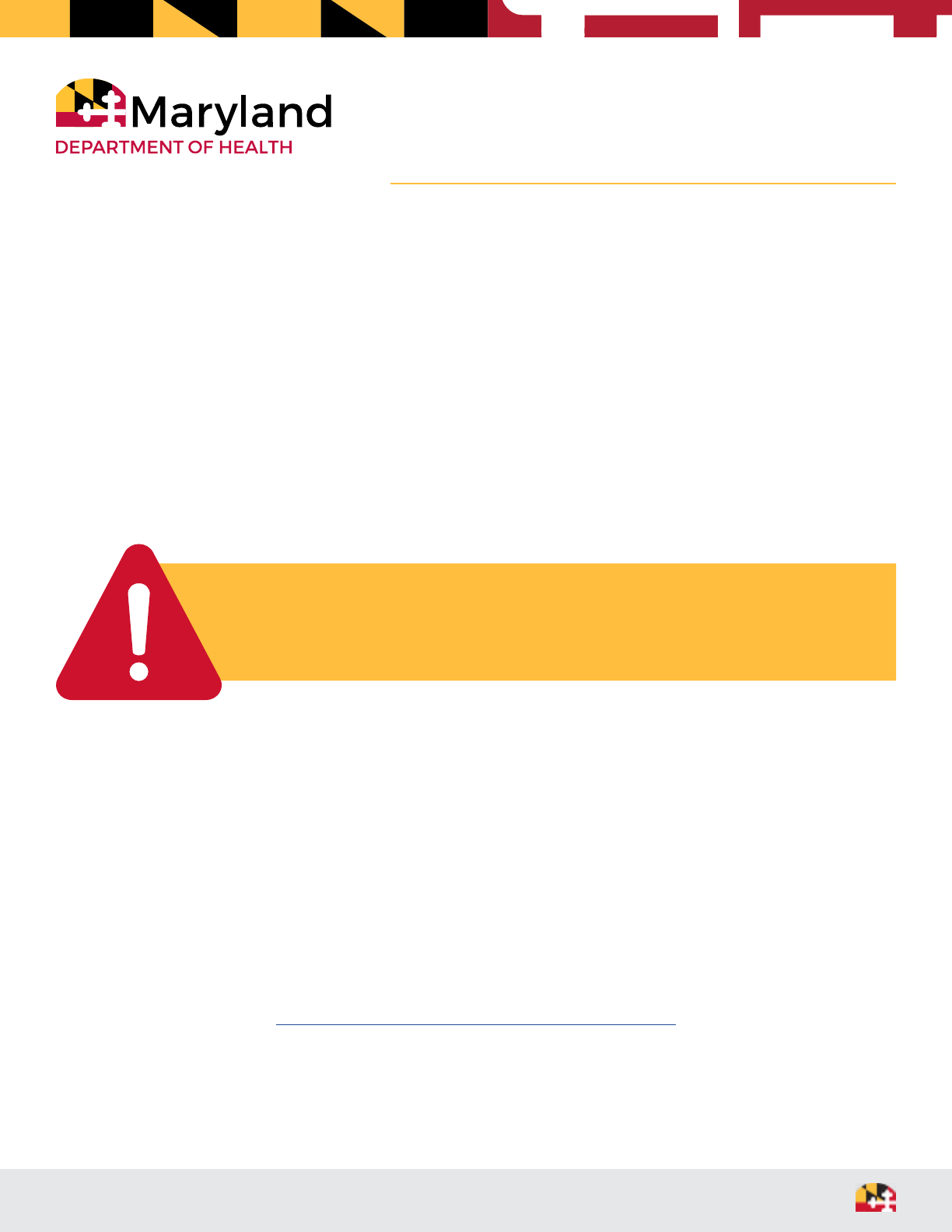
This guide walks you through information on the DDA website with links you can click on to see more resources.
Click the Table of Contents headings to go to the section of your choice.
The guide is in plain language to make it easy to understand. Except for technical terms you should know, we
use common words. Important words and ideas are in bold.
If you have any questions, please contact
(410) 767-5600
or
(844) 253-8694
Or visit:
Developmental Disabilities Administration
https://health.maryland.gov/dda/Pages/home.aspx
Note: This guide is a summary with important information. There are more requirements in the Medicaid
Waiver Program applications, laws, regulations, guidance and policies.
Maryland Developmental
Disabilities Administration
Find Out More:
844-253-8694 | health.maryland.gov/dda
Visit:
201 West Preston Street, Baltimore, MD 21201
3
GUIDE TO SERVICES FOR
PEOPLE WITH INTELLECTUAL AND
DEVELOPMENTAL DISABILITIES AND FAMILIES
Introduction
The Maryland Developmental Disabilities Administration (DDA) funds services and supports for children and
adults with intellectual and developmental disabilities and their families in Maryland. Services are paid for
with state and federal money. Services and supports paid for by the DDA help people live a life they choose
through self-determination, employment, independence, and family and community connections.
This guide will help you understand:
• The services funded by the DDA.
• Who is eligible for services.
• How DDA figures out who is eligible.
• How to apply for services.
• The services that may best meet your needs.
We have written this guide so as many people as possible understand the
information. If some things still are not clear, ask your DDA Regional Office
or your Coordinator of Community Services, if you have one.

4
Maryland Developmental
Disabilities Administration
Find Out More:
844-253-8694 | health.Maryland.gov/dda
Visit:
201 West Preston Street, Baltimore, MD 21201
What is the Developmental Disabilities
Administration (DDA)?
________________________________________________________________ 5
About the DDA ___________________________________________________________________________________________ 5
Mission, Vision, and Values
_______________________________________________________________________________ 5
How the DDA is Organized ________________________________________________________________________________ 6
Regional Contact Information ____________________________________________________________________________ 7
How the DDA Pays for Services __________________________________________________________________________ 7
Overview of DDA Medicaid Waiver Programs ____________________________________________________________ 8
DDA Eligibility Application Process
_________________________________________ 9
How You Apply for DDA Services _________________________________________________________________________9
Information that Must be Included in Your DDA Application for Eligibility ______________________________ 9
DDA Eligibility Application Process _______________________________________________________________________ 10
DDA Application for Eligibility ____________________________________________________________________________11
DDA Eligibility Determination (Decision) ________________________________________________________________ 12
Access _____________________________________________________________________________________________ 14
DDA Priority Categories _________________________________________________________________________________ 14
Transitioning Youth ______________________________________________________________________________________ 15
DDA Waivers Application Process ________________________________________________________________________ 16
Person-Centered Planning
________________________________________________________ 19
Pre-Planning ____________________________________________________________________________________________ 20
Person-Centered Plan Development ____________________________________________________________________ 21
Rights and Responsibilities ______________________________________________________________________________ 22
You and Your Team’s Roles ______________________________________________________________________________ 22
Role of the Coordinator of Community Services (CCS) __________________________________________________ 24
Choosing Service Providers _____________________________________________________________________________ 26
DDA Services ________________________________________________________________________________ 27
Self-Directed Services ___________________________________________________________________________________ 28
Meaningful Day Services ________________________________________________________________________________ 29
Support Services ________________________________________________________________________________________ 40
Residential Services ____________________________________________________________________________________ 59
DDA Low Intensity Support Services (LISS) ______________________________________________________________ 64
Additional Resources
_________________________________________________________________ 65
Important Words and Other Information ________________________________________________________________ 65
Community Resources Recommended by Maryland Families __________________________________________ 68
Lifestage Resources ______________________________________________________________________________________71
Table of Contents
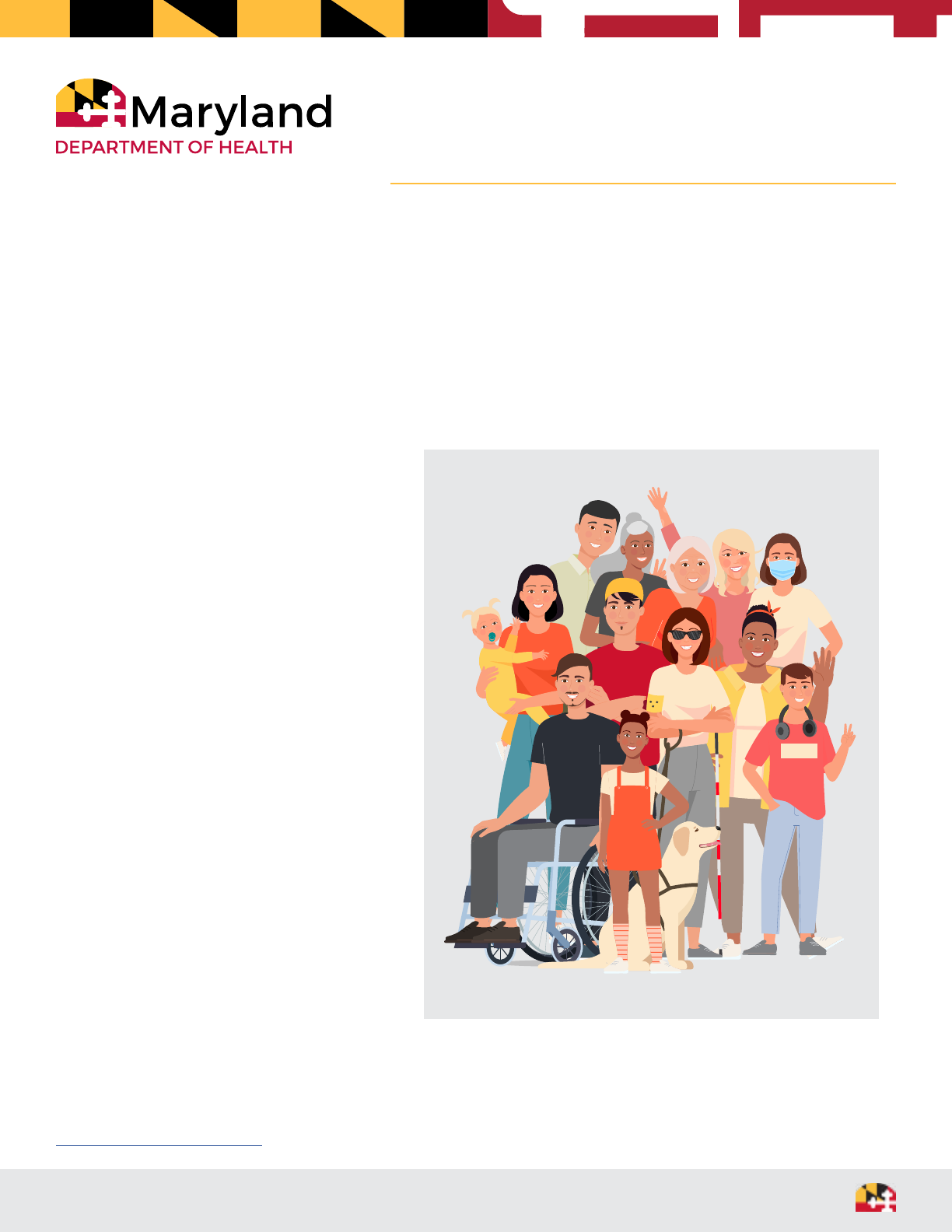
Maryland Developmental
Disabilities Administration
Find Out More:
844-253-8694 | health.maryland.gov/dda
Visit:
201 West Preston Street, Baltimore, MD 21201
Back to Table of Contents
5
GUIDE TO SERVICES FOR
PEOPLE WITH INTELLECTUAL AND
DEVELOPMENTAL DISABILITIES AND FAMILIES
What is the Developmental Disabilities Administration
(DDA)?
_________________________
About the DDA
The Maryland Developmental Disabilities Administration (DDA) is the state agency that funds supports and
services for children and adults of all ages with
intellectual and developmental disabilities.
These supports and services are provided at
home and in the community.
_________________________
Mission, Vision, and Values
The DDA supports people with intellectual
and developmental disabilities to direct their
lives and services. This means they:
• Are in control of their own lives.
• Make decisions about the services and
supports they get, with help if they want it.
The DDA wants everyone to be able to live, love,
learn, work, play in the community, and go after
their hopes, dreams and goals. The DDA wants
people with intellectual and developmental
disabilities and their families to have the support
they need and want to make this happen.
People with intellectual and developmental
disabilities, their families, and other
community members help the DDA with this
work. This supports people to receive services
based on what they need to reach their goals.
The DDA believes supports and services must be person-centered, flexible and focused on the needs and choices
of each person and family.
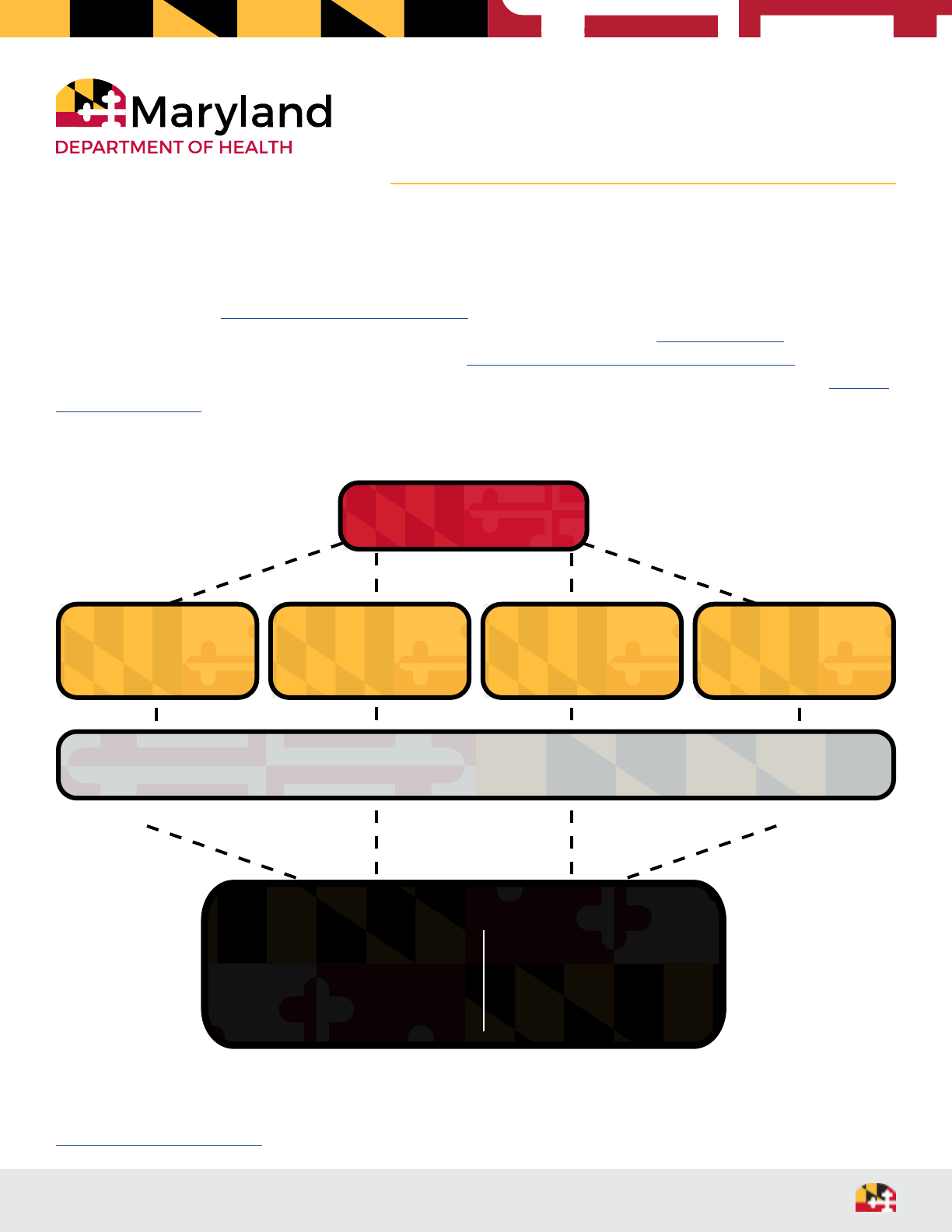
Maryland Developmental
Disabilities Administration
Find Out More:
844-253-8694 | health.maryland.gov/dda
Visit:
201 West Preston Street, Baltimore, MD 21201
Back to Table of Contents
6
GUIDE TO SERVICES FOR
PEOPLE WITH INTELLECTUAL AND
DEVELOPMENTAL DISABILITIES AND FAMILIES
_________________________
How the DDA is Organized
The DDA is part of the Maryland Department of Health. Most of your communications with the DDA will be
through your regional office. There are four regional offices throughout Maryland. Regional Offices can help
answer your questions. The DDA also works closely with Coordinators of Community Services (CCS). A CCS
supports you to make a Person-Centered Plan that includes the services you need. CCS details are in the Person-
Centered Planning section of this guide.
_________________________
DDA Headquarters
Southern
Maryland
Regional Office
Western
Maryland
Regional Office
Coordinators of Community Services
Eastern Shore
Regional Office
Central
Maryland
Regional Office
Service Providers
• DDA-Approved
Service Providers
• Employees
• Vendors
• Financial Management
and Counseling Services
Self-Directed Services Traditional Services
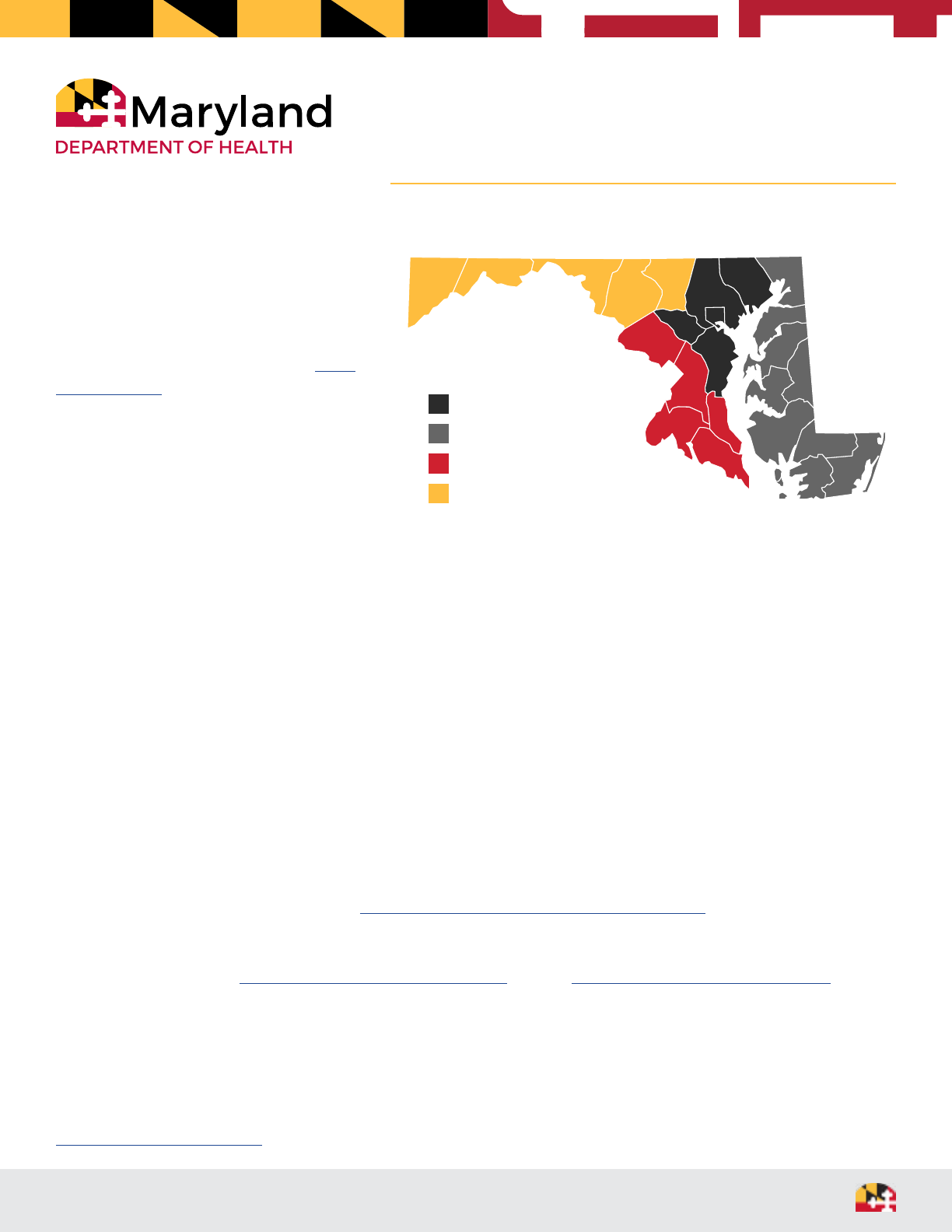
Maryland Developmental
Disabilities Administration
Find Out More:
844-253-8694 | health.maryland.gov/dda
Visit:
201 West Preston Street, Baltimore, MD 21201
Back to Table of Contents
7
GUIDE TO SERVICES FOR
PEOPLE WITH INTELLECTUAL AND
DEVELOPMENTAL DISABILITIES AND FAMILIES
Regional Contact Information
The DDA regions are Central Maryland,
Eastern Shore, Southern Maryland, and
Western Maryland. To learn which regional
office serves your county and the contact
information for each office, use the DDA
Regional Map.
_________________________
How the DDA Pays for Services
The DDA pays for approved services with
Medicaid funding. Medicaid covers short-term and long-term services for people who are eligible. An example of
a short-term service is a change to your home to make it more safe. Long-term services, like personal supports or
employment services, help people keep, learn, or improve skills needed for daily activities. The DDA pays for some
services with state funding when it is available and when approved by the DDA.
When Medicaid pays for long-term services in a person’s home and community, it does it through a Home and
Community-Based Services Waiver. A Waiver is an agreement between the state and federal government about:
• The kind of services that people can get,
• Who can provide the services and the providers, and
• How the services are provided to people.
The DDA runs three Waiver programs. They are the Family Supports Waiver, Community Supports Waiver and the
Community Pathways Waiver. Some of the differences between the Waivers are:
• Who is eligible.
• What services are offered.
The Waivers are described in detail in the Overview of DDA Medicaid Waiver Programs section of this guide. To
get the DDA Waiver services, you must show both Medicaid and the DDA that you meet their requirements. To do
this, there are two different applications you must complete. They are the DDA Eligibility Application and the DDA
Waivers Application. The DDA Eligibility Application Process and the DDA Waivers Application Process
sections of this guide have information about these applications.
DDA Regional Offices
Central Maryland
Eastern Shore
Southern Maryland
Western Maryland
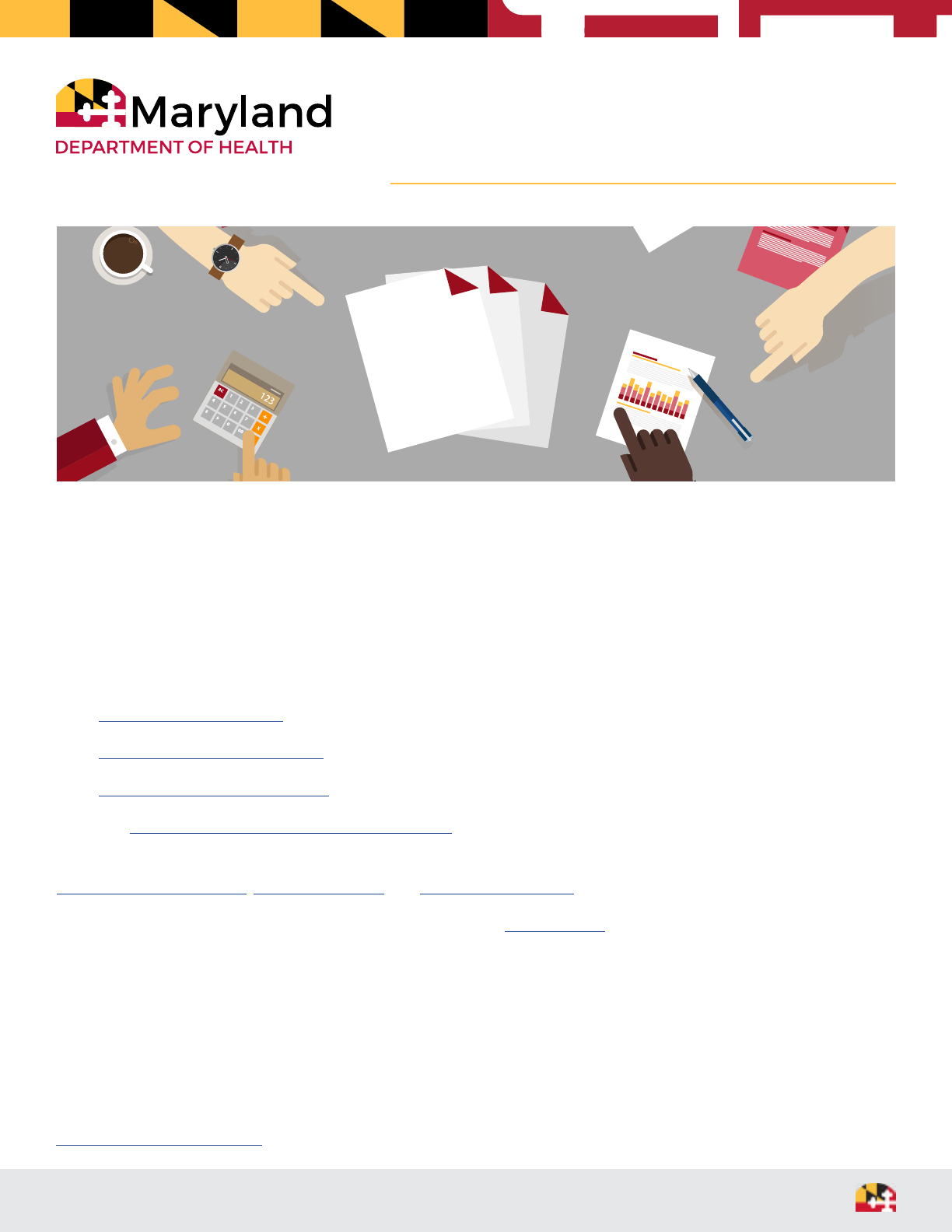
Maryland Developmental
Disabilities Administration
Find Out More:
844-253-8694 | health.maryland.gov/dda
Visit:
201 West Preston Street, Baltimore, MD 21201
Back to Table of Contents
8
GUIDE TO SERVICES FOR
PEOPLE WITH INTELLECTUAL AND
DEVELOPMENTAL DISABILITIES AND FAMILIES
DDA
Medicaid
Waiver
Programs
_________________________
Overview of DDA Medicaid Waiver Programs
Waiver programs offer you services in your home and community to support you to work towards your personal
goals. The Centers for Medicare and Medicaid Services (CMS) provides states with federal funding for these
services.
The DDA operates three Medicaid Home and Community-Based Waiver programs. The three Waivers are:
• Family Supports Waiver
• Community Supports Waiver
• Community Pathways Waiver
There are eight other Medicaid Waivers in Maryland. You may only be in one Waiver at a time.
The DDA Waiver programs offer services that support your needs. The main types of services are categorized as
Meaningful Day Services, Support Services and Residential Services.
Information about the services within the DDA Waivers is in the DDA Services section of this guide. This section
includes service descriptions, details about what the service includes, who can get each service, what you can direct
yourself, and the DDA Waiver programs that include each service. Keep in mind that all services are provided based
on your need. This is sometimes called “assessed need” because it is based on what you, your CCS, support team, and
professional assessment tell the DDA you need.
More information and specific requirements are noted in each of the DDA Waiver programs’ federal application
and regulations.

Maryland Developmental
Disabilities Administration
Find Out More:
844-253-8694 | health.maryland.gov/dda
Visit:
201 West Preston Street, Baltimore, MD 21201
Back to Table of Contents
9
GUIDE TO SERVICES FOR
PEOPLE WITH INTELLECTUAL AND
DEVELOPMENTAL DISABILITIES AND FAMILIES
DDA Eligibility Application Process
_________________________
How You Apply for DDA Services
These are the things you must do to apply for DDA services. This is the DDA eligibility determination process.
1. Complete the DDA Application for Eligibility.
2. Submit supporting documentation. Supporting documentation is records, reports, and other information
that help show you have a developmental disability. Developmental disability is defined in the DDA
Eligibility Determination (Decision) section of this guide.
3. Answer questions from a Coordinator of Community Services (CCS) and the DDA about you and your
needs.
_________________________
Information that Must be Included in Your DDA Application for Eligibility
• Current contact information including your telephone number, address, and email if you have one.
• Your Social Security number. This is a nine-digit number assigned to you from the
Social Security Administration.
• If you applied to the Maryland Medical Assistance (Medicaid) program, include the date you applied and
a copy of your Medicaid card if you have one. If you do not remember when you applied, you can leave this
blank.
• Supporting documentation that shows you have a developmental disability. Some recommended but not
required examples are:
A psychological or a neuropsychological assessment if you have an intellectual disability, autism
spectrum disorder or traumatic brain injury.
Tests of adaptive functioning evaluate your social and emotional skills as well as life skills and abilities.
Some examples of adaptive tests include: Vineland Adaptive Behavior Scale (Vineland-3); Adaptive
Behavior Assessment System, Third Edition (ABAS3); Scales of Independent Behavior-Revised (SIB-R).
Autism spectrum rating scales such as an ADOS or ASRS assessment. See page 65 for an explanation.
Medical documentation if you have a medical disability or related condition. This may include physician
reports with medical history, medical tests, progress notes, etc.
Education reports such as your Individualized Education Program (IEP) from school, speech and
language evaluations, and behavioral, vocational, occupational or physical therapy (OT/PT) assessments.
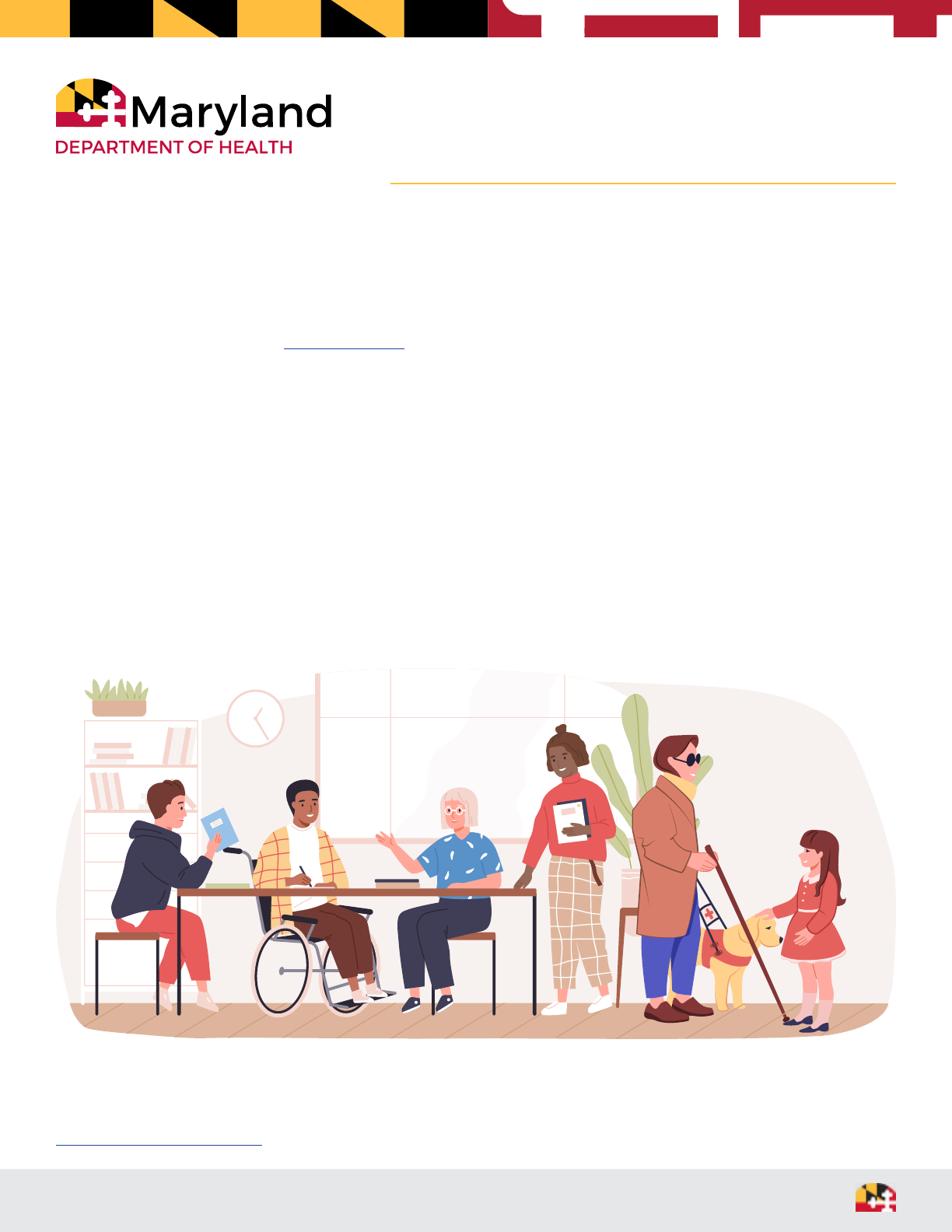
Maryland Developmental
Disabilities Administration
Find Out More:
844-253-8694 | health.maryland.gov/dda
Visit:
201 West Preston Street, Baltimore, MD 21201
Back to Table of Contents
10
GUIDE TO SERVICES FOR
PEOPLE WITH INTELLECTUAL AND
DEVELOPMENTAL DISABILITIES AND FAMILIES
_________________________
DDA Eligibility Application Process
1. Complete the DDA Application for Eligibility. Make sure you include supporting documentation. If you need
help, you can contact your Regional Office. The DDA will send you an Acknowledgement Letter within seven
(7) days of the receipt of your application.
2. Participate in a face-to-face interview with a DDA staff member or CCS. You will answer questions to help the
DDA understand your needs and challenges. Your CCS will also help you submit all required documentation to
the DDA. The CCS has 45 days to complete this step with you.
3. The DDA reviews your application and the recommendation made by the person who interviewed you. The
DDA then decides if you are eligible for DDA services based on the requirements.
4. The DDA sends you a letter saying whether you are eligible for services. This is called a “DDA eligibility
determination letter.” The entire eligibility and access process should be completed in 60 days. Some
determinations may take longer if the face-to-face interview is rescheduled or requested information has not
been received. Contact your regional office if you have not gotten your letter within 60 days after submitting
your eligibility application.
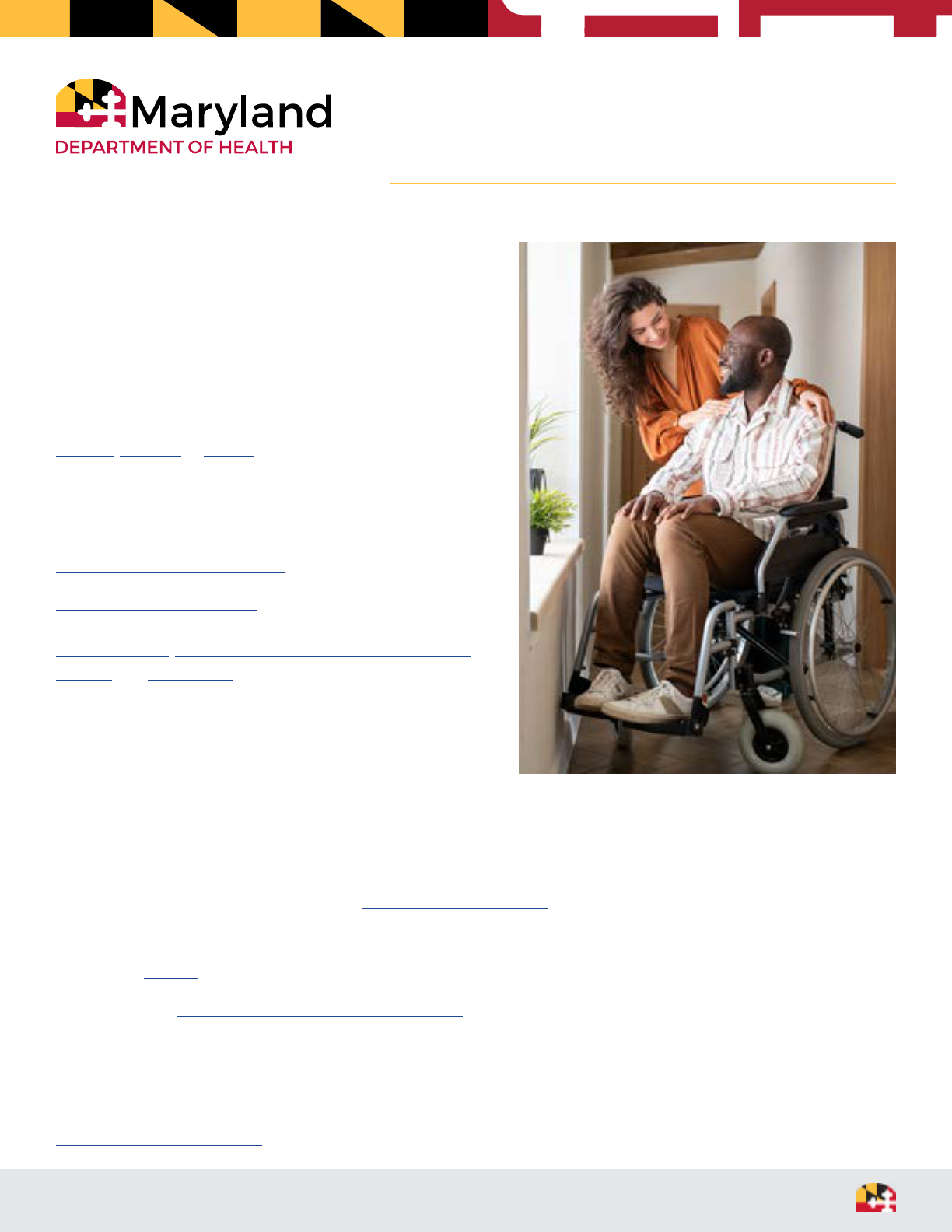
Maryland Developmental
Disabilities Administration
Find Out More:
844-253-8694 | health.maryland.gov/dda
Visit:
201 West Preston Street, Baltimore, MD 21201
Back to Table of Contents
11
GUIDE TO SERVICES FOR
PEOPLE WITH INTELLECTUAL AND
DEVELOPMENTAL DISABILITIES AND FAMILIES
_________________________
DDA Application for Eligibility
The DDA offers services to both children and adults. You can
apply at any age.
Complete the DDA’s application for eligibility to apply
for DDA services. You or anyone you choose to help, can
complete the application. The application is available in
English, Spanish or Arabic. The DDA Application for Services
can be downloaded from the DDA’s website, mailed to
you, or you can pick one up from any of the DDA’s regional
offices. The DDA staff at your regional office can help you
complete the application. Contact information is in the
Regional Contact Information section of this guide.
DDA Advocacy Specialists can help you too. Advocacy
Specialists have personal experience with resources like
Social Security, MD Division of Rehabilitation Services
(DORS) and paratransit. They can share self-advocacy tips
and talk to you about resources in the community.
Regional Coordinators of Family Support (RCFS) can also
help. They understand the issues and needs that families
may face in caring for their family member with a disability.
They are available to assist families with navigating the DDA
services as well as other state and local resources, supports and services.
Other things to know:
• The DDA calls children ages 14 to 21, Transitioning Youth (TY). The DDA encourages Transitioning Youth to
apply for DDA services while still in school. Applying while still in school will help make sure there is not a gap
in services when youth leave school and need adult services. More information about Transitioning Youth is
in the Access section of this guide.
• The DDA’s Low Intensity Support Services (LISS) does not require this application.

Maryland Developmental
Disabilities Administration
Find Out More:
844-253-8694 | health.maryland.gov/dda
Visit:
201 West Preston Street, Baltimore, MD 21201
Back to Table of Contents
12
GUIDE TO SERVICES FOR
PEOPLE WITH INTELLECTUAL AND
DEVELOPMENTAL DISABILITIES AND FAMILIES
_________________________
DDA Eligibility Determination
(Decision)
The DDA will send you an eligibility
determination letter after reviewing
your application and supporting
documentation. Your eligibility
determination letter includes eligibility
categories. The DDA eligibility categories
are Developmental Disability, Supports
Only and Not Eligible.
The Developmental Disability or
(DD) category is for people who have a
developmental disability as described in
Maryland State law. DD Eligibility means:
• You have a developmental disability. Examples can be intellectual disability, cerebral palsy and autism.
There are many others;
• Your disability is a physical or mental disability, or both. You cannot just have a mental illness;
• Your developmental disability is severe and chronic;
• You will probably have your disability your whole life (that means it is chronic);
• Your disability started before you were 22 years old;
• You need support or services to live independently; and
• You need support and services that are planned and coordinated for you.
This category means you qualify for DDA services, and you will be provided with a CCS. More information about
CCS is in the Person-Centered Planning section of this guide.
The Supports Only (SO) category is for people who do not meet all the eligibility criteria for DD category as
described in Maryland State law. Supports Only eligibility means:
• You have a developmental disability. Examples can be intellectual disability,
cerebral palsy, and autism. There are many others; and
• You will probably have your disability your whole life (that means it is chronic).
DID YOU KNOW? –––––––––––––––––––––––––
People with developmental disabilities may be eligible to
access various programs and services without needing
DDA eligibility such as:
D Early Childhood Intervention Services (i.e. Infant and
Toddlers Program, Family Services)
D Medicaid’s Community First Choice Program
D Autism Waiver
D Model Waiver
D Department of Human Services — Respite Program
D Department of Disabilities — Attendant Care Program
D Other local, county and federal programs
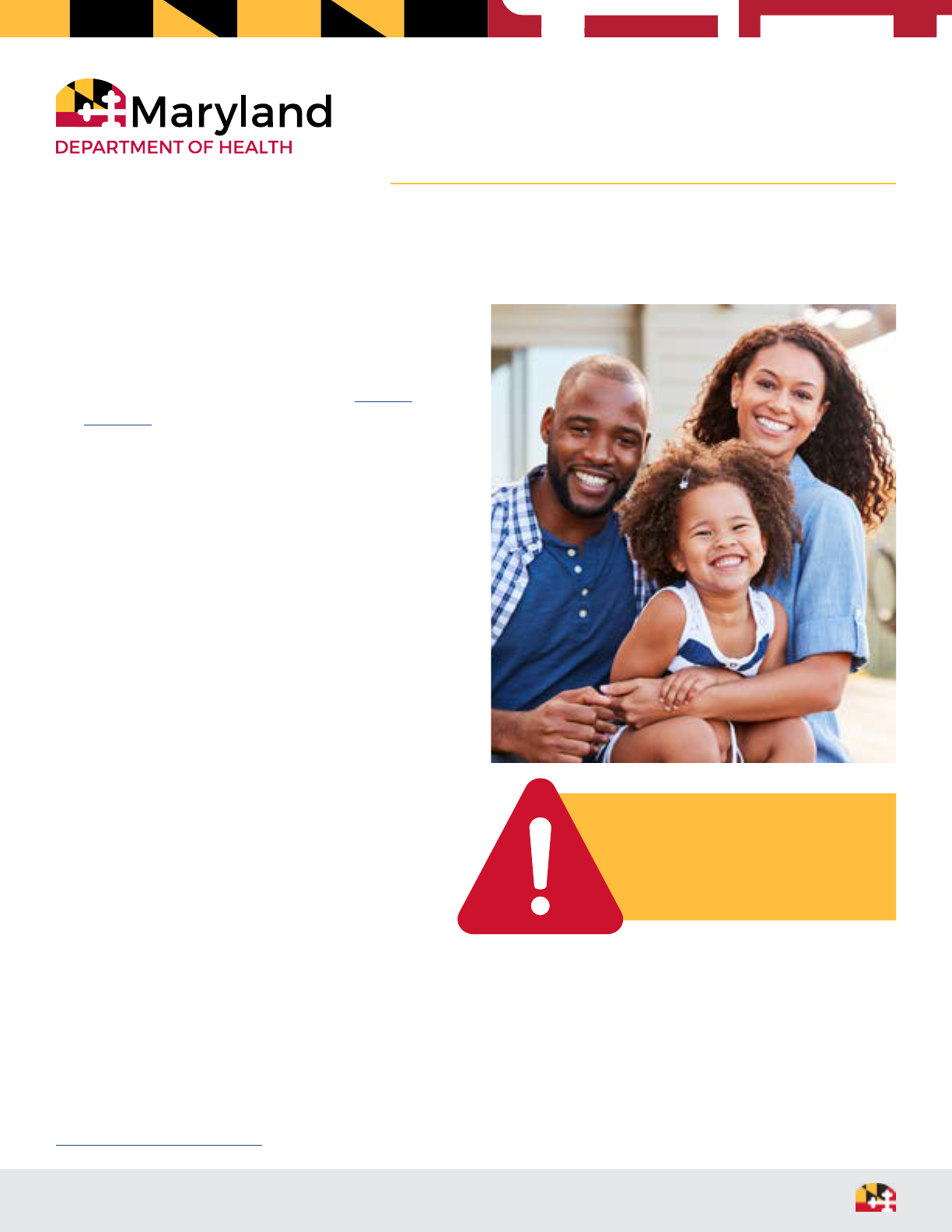
Maryland Developmental
Disabilities Administration
Find Out More:
844-253-8694 | health.maryland.gov/dda
Visit:
201 West Preston Street, Baltimore, MD 21201
Back to Table of Contents
13
GUIDE TO SERVICES FOR
PEOPLE WITH INTELLECTUAL AND
DEVELOPMENTAL DISABILITIES AND FAMILIES
The Not Eligible category is for people who have not met any of the DDA eligibility criteria in Maryland State law.
In addition to your eligibility category, your eligibility determination letters include:
1. Phone numbers to call if you need the letter in an
accessible format or if you need help understanding
the letter.
2. Information about your eligibility and priority
category. Priority categories help the DDA serve
people with the greatest need first.
3. An explanation of your eligibility determination
based on the eligibility criteria.
4. If you were found eligible for support from a CCS, you
get an explanation of what a CCS can do for you.
5. A form to request a reconsideration of your eligibility
if you do not agree with the DDA’s decision. If you do
not agree with the DDA’s decision and you have new
information in addition to what you provided with
your DDA eligibility application, you may ask the DDA
to reconsider at any time. This means you want the
DDA to review your information to see if they will
change their decision about what you are eligible
for. To do that, send the new information to
your regional office with the Request for
Reconsideration form you received with the DDA
eligibility determination letter. You will receive a
new eligibility determination letter following your
request for reconsideration.
6. An explanation of your right to appeal the DDA’s
decision and how to request a hearing.
Your request for a hearing must be postmarked or delivered by facsimile (fax: (410) 333-5154 with “Attention
Appeals”) to the Maryland Department of Health’s Office of Health Services within 90 days of receiving the
eligibility determination letter.
Requests for Reconsideration
and formal appeal options are
opportunities to provide more
information to the DDA.

Maryland Developmental
Disabilities Administration
Find Out More:
844-253-8694 | health.maryland.gov/dda
Visit:
201 West Preston Street, Baltimore, MD 21201
Back to Table of Contents
14
GUIDE TO SERVICES FOR
PEOPLE WITH INTELLECTUAL AND
DEVELOPMENTAL DISABILITIES AND FAMILIES
Access
_________________________
DDA Priority Categories
Being found eligible for DDA services does not mean you will get services right away.
Everyone who is eligible for DDA services is put in a priority category based on need. Priority categories help the
DDA serve people with the greatest need first. When you are in a priority category you are on the DDA Waiting
List. The DDA Waiting List is a list of children and adults with developmental disabilities who are waiting for
funding from the DDA for home and community services.
Priority categories are based on several important things:
• How soon you need services;
• Your strengths and needs and your caregiver’s strengths and needs, if you have one; and
• The environment you live in.
You and anyone who completes the DDA application for eligibility, may move between priority categories while
waiting to access services. These categories are:
1. Crisis Resolution –– You are in a crisis or emergency situation. For example:
• You were, or still are, being abused or neglected;
• You are homeless; or
• Your caregiver is not able to meet your needs.
People in this category typically access services within 48 hours.
2. Crisis Prevention – You are not currently in crisis but are at risk of meeting the crisis resolution category
within a year.
People can remain within this category up to 1 year, however most people are in this category less than 6
months.
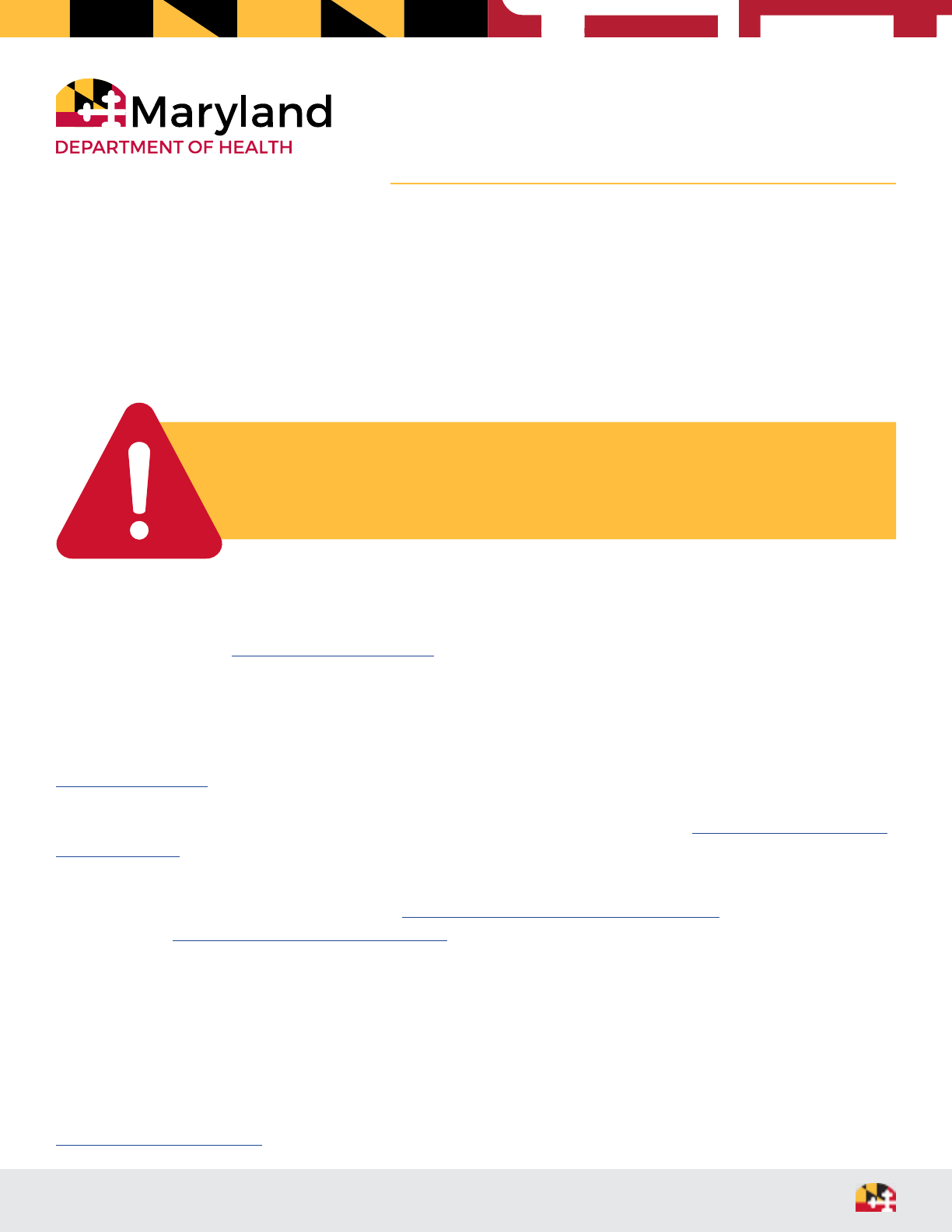
Maryland Developmental
Disabilities Administration
Find Out More:
844-253-8694 | health.maryland.gov/dda
Visit:
201 West Preston Street, Baltimore, MD 21201
Back to Table of Contents
15
GUIDE TO SERVICES FOR
PEOPLE WITH INTELLECTUAL AND
DEVELOPMENTAL DISABILITIES AND FAMILIES
3. Current Request – You are not in a crisis situation but have a current need for services.
People can remain in this category up to 3 years, however most people are in this category less than 1 year.
4. Future Needs – You are not looking for services now, but will need services within the next three or more
years. If you are currently getting services through the school system, other programs, or another Waiver like
the Autism Waiver, you will be in this category. A CCS is not provided to people in this category but you can
still have an eligibility determination done. If your situation changes, please contact your regional office.
_________________________
Transitioning Youth
Children have access to special education services until they finish the school year when they turn 21, or earlier
if they graduate from high school. The law requires that students who need special education services receive a
free and appropriate public education (FAPE). This is why it is called an entitlement. A student’s special education
needs are listed in their Individualized Education Program (IEP).
Adult services are different from entitlements. Not everyone gets them. You have to meet eligibility requirements.
Transitioning Youth is a term used for children ages 14 to 21 who are preparing to leave school. The DDA has
a special category of eligibility and priority for services through the Governor’s Transitioning Youth Initiative for
people 21 through 22 years of age. This makes it possible for the DDA, working with the Division of Rehabilitative
Services (DORS), to fund employment services and other day services for eligible students leaving school who
otherwise may have gone on the DDA Wait List.
Information about Transition Planning is in the MD Secondary Transition Planning Guide. You may also want to
learn about the Charting the LifeCourse framework. This was created to help people and families of all abilities
and all ages develop a vision for a good life. Many of the Charting the LifeCourse tools are used in the pre-planning
phase of the DDA’s person-centered planning process. Pre-planning helps to:
• Think about what you need to know and do;
• Identify how to find or develop supports; and
• Discover what it takes to live the life you want to live.
No matter what priority category you are put in, it is very important to let the DDA
know of any changes to your life. Some examples are a change to your phone
number, address or caregiver. Big life changes may change your priority category.
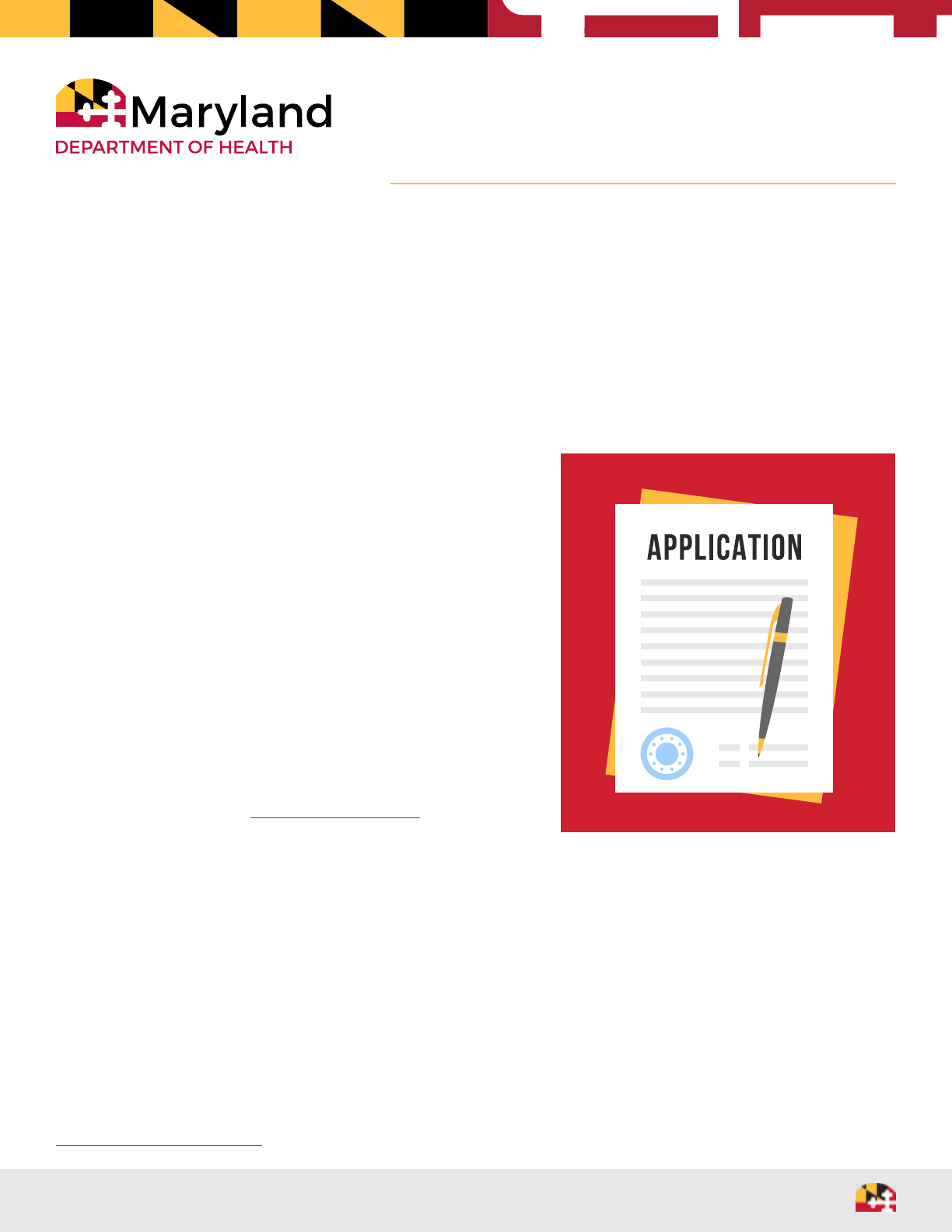
Maryland Developmental
Disabilities Administration
Find Out More:
844-253-8694 | health.maryland.gov/dda
Visit:
201 West Preston Street, Baltimore, MD 21201
Back to Table of Contents
16
GUIDE TO SERVICES FOR
PEOPLE WITH INTELLECTUAL AND
DEVELOPMENTAL DISABILITIES AND FAMILIES
_________________________
DDA Waivers Application Process
DDA services are usually paid for by Medicaid through the DDA Waivers. When the DDA has funding for your
priority category and you have the greatest need, your CCS will help you with the DDA Waivers application. The
DDA Waivers application is the next step to take to get services.
Once the DDA has determined you are eligible for services, you must apply for the DDA Waivers so the DDA can
use Medicaid funding for your services. Your CCS will help you with the DDA Waivers application process, when:
1. You are on the Waiting List and in a priority category;
2. The DDA has funding for your priority category; and
3. You have the greatest need.
Each year you want to continue receiving DDA Waiver services,
you must show Medicaid that you still meet technical, medical
and financial eligibility criteria. This is called a redetermination.
Your CCS will help you with this process.
Technical eligibility is specific to each Waiver program. For the
DDA Waiver programs this includes:
• Being a Maryland resident,
• Meeting the age or service need requirements, and
• Having an approved Person-Centered Plan (PCP).
Medical eligibility means meeting the institutional level of care of
an Intermediate Care Facility for Individuals with Intellectual and Developmental Disabilities (ICF/IID). This means
that without services, you would need the amount of care provided in a medical institution. Holly and Potomac
Centers are examples of ICF/IIDs. You do not have to go into an institution or agree to apply to an institution to
receive Waiver services.
Financial eligibility means not exceeding the Waiver programs’ income and asset requirements. Your caregiver
or parents’ income is not counted. The Maryland Department of Health’s Eligibility Determination Division (EDD)
figures out if you are financially eligible. They look at records like bank statements, assets (some things you own),
trusts and medical expenses.

Maryland Developmental
Disabilities Administration
Find Out More:
844-253-8694 | health.maryland.gov/dda
Visit:
201 West Preston Street, Baltimore, MD 21201
Back to Table of Contents
17
GUIDE TO SERVICES FOR
PEOPLE WITH INTELLECTUAL AND
DEVELOPMENTAL DISABILITIES AND FAMILIES
These are the six parts of a complete DDA Waivers packet:
1. Medicaid Application — Your CCS can
help you complete this application if
you have not already applied. If you
already applied for Medicaid (Maryland
Medical Assistance Program) and
were found eligible, your CCS reviews
a shorter application.
2. Person-Centered Plan (PCP) —
The PCP is all about you and the type of services you need. Your CCS helps you to develop and complete this
every year. Once you complete your PCP, your CCS sends it to the DDA.
You may decide to ask people you trust to help identify your goals and dreams and the support and services
you’ll need to achieve them. The people you choose to help you are often called your support team. You can
choose the people you want to involve in creating a plan which reflects who you are and what is important
to and for you.
3. Level of Care (LOC) Form — This states that you meet the ICF/IID medical level of care need. Your CCS
completes this form and sends it to the DDA each year.
4. Freedom of Choice Form — This states that you choose to receive services in your community instead of
an institution and your CCS told you about your service and provider choices if you are eligible for the DDA
Waivers.
5. Financial Eligibility Supporting Documentation — Financial documents are things like bank statements,
assets (some things you own), trusts and medical expenses. You will work with your CCS to submit these
to the Eligibility Determination Division (EDD) as part of this application. The EDD works for Maryland
Medicaid. You must report to your CCS and the EDD any changes to your income or assets throughout the
year. There are a couple of things about this to keep in mind:
• Unless the EDD requests a review, you do not need to have your financial eligibility determined each year
if you have Supplemental Security Income (SSI).
• The EDD will review your financial eligibility each year if you have services paid for through the DDA
Waiver, but do not have SSI.
6. EDD Release Form — This form allows your CCS to get information about financial documents requested
by the EDD so they can assist you.
The Maryland Medicaid Assistance Program
provides access to health services, prescriptions, and
specialty services for children and adults based on medical
necessity.
Click Maryland Medical Assistance (Medicaid) for more
information.
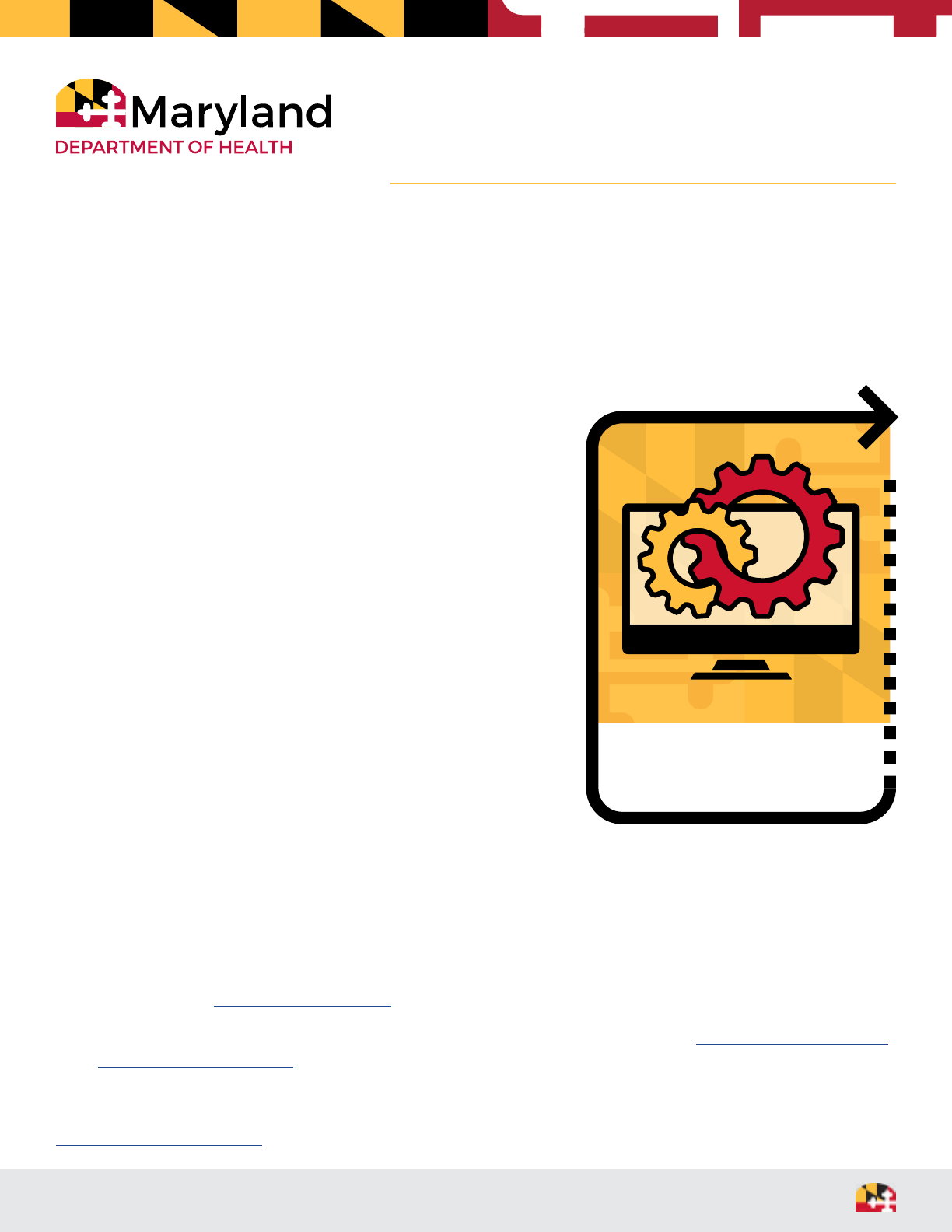
Maryland Developmental
Disabilities Administration
Find Out More:
844-253-8694 | health.maryland.gov/dda
Visit:
201 West Preston Street, Baltimore, MD 21201
Back to Table of Contents
18
GUIDE TO SERVICES FOR
PEOPLE WITH INTELLECTUAL AND
DEVELOPMENTAL DISABILITIES AND FAMILIES
After completing and signing the DDA Waivers application packet and related documents, give them to your CCS.
These are the next steps:
1. The CCS sends in your Waivers application packet to the DDA using the LTSSMaryland system. The
LTSSMaryland system supports case management and service delivery for several Maryland Home and
Community-Based Services (HCBS) programs. It helps with the coordination, delivery, and payment of services
for people in the DDA’s Waivers and State-Funded services.
2. Your regional office checks to make sure your application
is complete and meets federal rules. Once your application
is complete, the regional office tells the Eligibility
Determination Division (EDD) if they find you meet the
technical and medical eligibility criteria for the DDA
Waivers. The recommendation from the DDA is called the
Authorization to Participate (ATP).
3. Next, the EDD reviews your application. The EDD lets
you and your CCS know if more information is needed to
make a financial eligibility decision. If more information is
requested, provide it as soon as possible. If you take a long
time to respond, you may have to restart the DDA Waivers
application process.
4. The EDD will send you a letter saying you are:
• Eligible and enrolled in the DDA Waiver program, or
• Not eligible and cannot get the DDA Waiver services.
Other things to know:
• If you are receiving DDA Waiver services, you can get these services unless you move out of state, choose to
stop, or no longer meet the eligibility requirements. If you are with a military family who moves out of state
and then returns, you can be re-enrolled and do not have to go on the Wait List.
• Once enrolled in a DDA Waiver program, you are also eligible for the Maryland Medicaid health insurance
program called HealthChoice Program.
• Children who receive DDA Waiver services are eligible to get Maryland Medicaid’s Early Periodic Screening
Diagnosis and Treatment services.
Topic-Specific
Webinars
LTSSMaryland
#
...
#
...
At a Glance
Documents
Topic-Specific Policy
and Guidance
Live Training
...

Maryland Developmental
Disabilities Administration
Find Out More:
844-253-8694 | health.maryland.gov/dda
Visit:
201 West Preston Street, Baltimore, MD 21201
Back to Table of Contents
19
GUIDE TO SERVICES FOR
PEOPLE WITH INTELLECTUAL AND
DEVELOPMENTAL DISABILITIES AND FAMILIES
Person-Centered Planning
Everyone has the right to live, learn, love, work, play, and follow their hopes, dreams, and reach their goals in their
community. People are at the center of planning and creating a life that is meaningful to them. This is done
through Person-Centered Planning.
At any stage of life, it is a good idea to think about your vision for a good life. Children and families may find it
helpful to start thinking about life experiences now that will help support you to stay in or move towards an
inclusive, productive life in the future. This is especially important when making the transition from the school to
the adult service system.
If you receive the DDA Waiver or State Funded services, you will create a person-centered plan (PCP) with your CCS
and people who you choose to help. This will include:
• Your vision for your good life based on what
is important to and for you.
• Resources, support and services you need
that are not included in the DDA Waivers.
Examples of these might include support
provided by friends, families and co-workers
often known as informal or natural supports.
• Community resources and other state and
local programs.
• The service delivery model you want (self-
directed or traditional).
• The service provider(s) you choose.
• Waiver services you need to meet your
unmet needs.
• A description of how often you plan to use
these services.
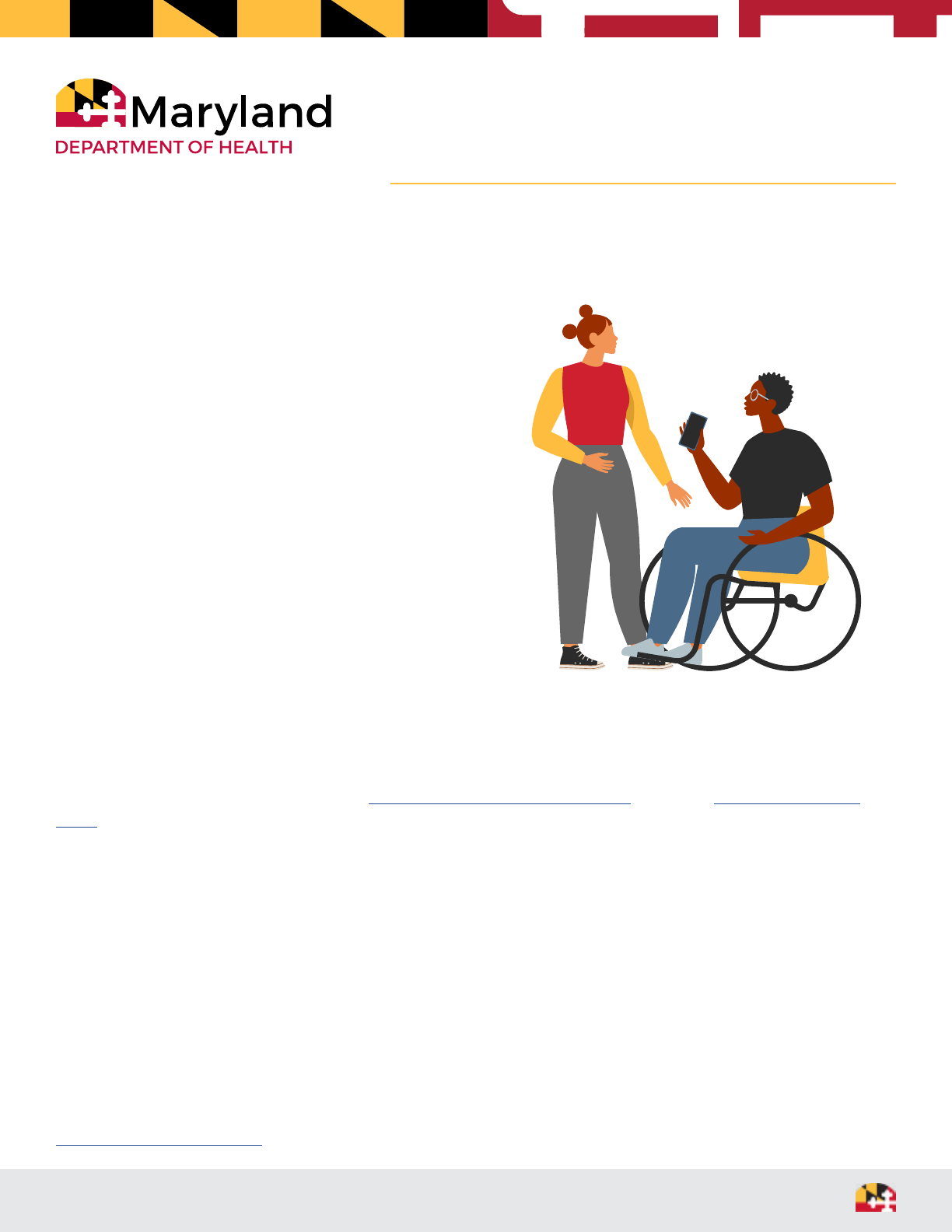
Maryland Developmental
Disabilities Administration
Find Out More:
844-253-8694 | health.maryland.gov/dda
Visit:
201 West Preston Street, Baltimore, MD 21201
Back to Table of Contents
20
GUIDE TO SERVICES FOR
PEOPLE WITH INTELLECTUAL AND
DEVELOPMENTAL DISABILITIES AND FAMILIES
_________________________
Pre-Planning
Pre-planning is an important step in the planning
process. It helps you explore and share your life
goals. It also helps you talk about needs you have
now or will have in the future. You, your CCS, and
people important to you will have pre-planning
conversations beginning 90 days before your annual
person-centered plan (PCP) is due to the DDA. These
conversations will identify what you want for your life.
The goal of pre-planning is to make sure your team
understands what you want and don’t want, your
strengths as well as the support you need to live the
life you want. Your voice is the most important voice.
Pre-planning makes sure that it is heard.
Your CCS will also talk to you about the PCP focus
areas. These help make sure that people with
developmental disabilities have good lives in their
communities where they are included, participate, and are active citizens. The nine focus areas are employment;
communication; lifelong learning; community involvement; day to day life; finance; home and housing; health and
wellness; and relationships.
During pre-planning, you may complete a Health Risk Screening Tool (HRST) and/or the Supports Intensity
Scale assessment completed during pre-planning. These tools help identify possible support needs and interests.
After you know what you want and need to live a good life, you and your team will use the HRST and other tools
and discussions to figure out your support need(s). This may include any needs that have changed or have not
been met. This will identify health care needs, health risks, and ways to meet your needs or decrease these risks.
You and your team are encouraged to think about resources other than DDA services. This means support from
the community and family, friends and others in your life.
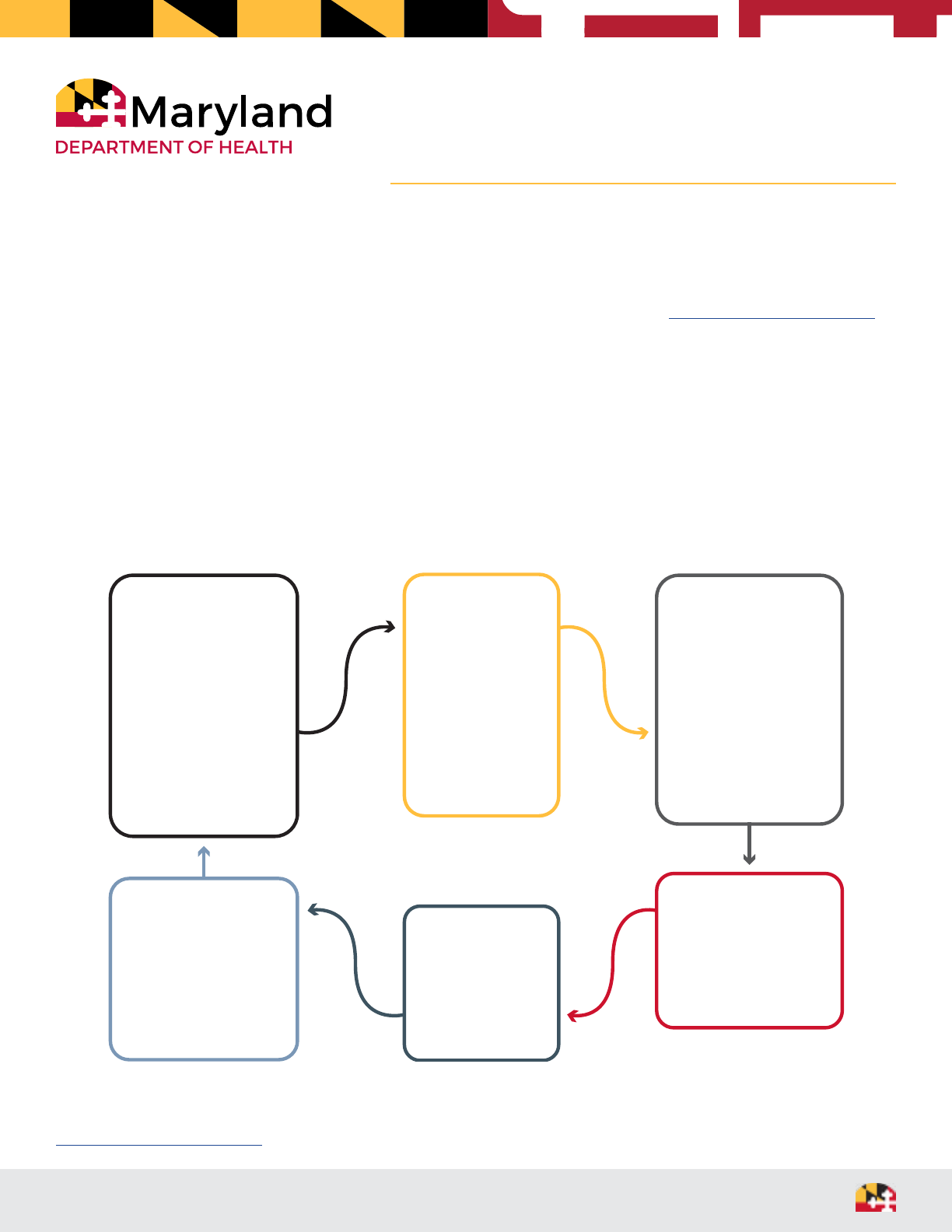
Maryland Developmental
Disabilities Administration
Find Out More:
844-253-8694 | health.maryland.gov/dda
Visit:
201 West Preston Street, Baltimore, MD 21201
Back to Table of Contents
21
GUIDE TO SERVICES FOR
PEOPLE WITH INTELLECTUAL AND
DEVELOPMENTAL DISABILITIES AND FAMILIES
_________________________
Person-Centered Plan Development
After pre-planning, you and your CCS will develop your person-centered plan (PCP). Person-centered planning
is an ongoing process of listening and learning. It will create a meaningful service and support plan that can be
changed as needed.
In the beginning of the planning process you and your team will create an initial plan. If anything happens after
creating the initial plan and you want to change the plan it is important that you let your team know. Changes can
be made at any time of the year. You do not have to wait for a formal meeting. If you make changes, it is called a
revised plan. Your PCP date (month/day) remains the same from year to year, even if you make changes. This is
called your Annual Plan Date.
Here is a chart to walk you through the PCP development and approval steps that happen each year. It includes
ongoing support from your CCS.
Beginning 90 days before your
Annual Plan Date, your CCS will:
Annual Person-
Centered Plan (PCP)
Development
You and members of your
support team will discuss your
goals along with natural and
community resources and
supports. Based on your
assessed need, you may also
discuss waiver services to
participate in for the
coming year.
Plan is Submitted
to the DDA
No later than 20 days before
your Annual Plan Date, your
CCS submits the PCP to DDA
for review and approval.
Pre-Planning
Meeting
Held within 30 to 60
days of your DDA
eligibility determination
or 90 days before the
Annual Plan Date. This
includes learning about
the different service
delivery models available
to you - traditional or
self-directed services.
Plan is
in Action
Your services and
supports are provided
according to the PCP.
Quarterly Check-Ins
with Your CCS
Your CCS will talk with you and
your team and observe how
things are going. They will see if
you are satisfied with the
progress on your PCP and if you
want changes. They will also see
if you are healthy and safe.
Annual Review
• Start or update any necessary
tools (i.e., HRST)
• Start updating the PCP
through conversations with
you and your support team
• Continue PCP development
for the year ahead by
discussing what you want to
achieve and what resources
are available to you.

Maryland Developmental
Disabilities Administration
Find Out More:
844-253-8694 | health.maryland.gov/dda
Visit:
201 West Preston Street, Baltimore, MD 21201
Back to Table of Contents
22
GUIDE TO SERVICES FOR
PEOPLE WITH INTELLECTUAL AND
DEVELOPMENTAL DISABILITIES AND FAMILIES
_________________________
Rights and Responsibilities
Everyone who receives services from the DDA has both rights and responsibilities. It is important that you
understand your rights. It is also important that you understand your responsibilities. You can find more resources
on the DDA Person-Centered Planning page under the Rights and Responsibilities heading. These include
documents you should go over with your CCS and your family or other people who you want support from.
If you feel that your rights are not respected or you feel unsafe, it is very important that you let someone you trust
know right away. Who you talk to is up to you. This can include your family or legal guardian (if you have one),
your CCS, your Support Broker (if you have one), or someone else on your team. You can also contact your DDA
Regional Office to help you. The DDA has many policies to protect your rights and your safety. Never wait to ask
for help if you need it.
_________________________
You and Your Team’s Roles
For both traditional and self-directed service models, you have many roles and responsibilities. Your role for both
traditional and self-directed service models is to:
1. Work with your team and your CCS to develop a vision for the life you want. This will help you figure out how
to get what you want through a person-centered planning process. This includes building a community life
and figuring out the types of support and services available and how often you get those services.
2. Participate in an individualized needs assessment. If you are self-directing services, this is what the DDA
uses to determine how much funding you get each year.
3. Schedule and participate in Person-Centered Plan review meetings as needed to be sure your needs are still
being met.
4. Determine whether you are satisfied (or not) with the staff and providers who support you. For self-directed
services, this includes people you employ, vendors and service providers (companies).
5. Develop a backup staffing and support plan to make sure: a) you are supported safely if there is an
emergency that keeps your regularly scheduled staff from reporting to work, and b) you have a place to go
if you have to be out of your home for some reason (like flooding or no electricity for extended time).
6. Communicate with your CCS and team if you feel you are not getting the supports you need or if someone
is treating you badly or in a way that you do not like.

Maryland Developmental
Disabilities Administration
Find Out More:
844-253-8694 | health.maryland.gov/dda
Visit:
201 West Preston Street, Baltimore, MD 21201
Back to Table of Contents
23
GUIDE TO SERVICES FOR
PEOPLE WITH INTELLECTUAL AND
DEVELOPMENTAL DISABILITIES AND FAMILIES
7. Be open to new ideas, changes and practicing some new skills. Your person-centered plan may result in
trying new things. These may have a little risk, but should not risk your health and safety.
8. Follow all federal and state guidelines, policies, regulations and laws. If you self-direct your services, you must
also agree to follow all Department of Labor laws.
9. Advocate for your rights. This means speaking up for yourself and standing up for what you believe.
Your role if you self-direct your services is also to:
1. Develop a self-directed budget for services approved in your person-centered plan (PCP). The budget is
based on the funds the DDA approves each year for your PCP.
2. Use your approved funds responsibly to achieve what is in your PCP.
3. Consider if you want to find people or agencies that can coach and mentor you to make hiring and
purchasing decisions. This will help you put your PCP into action.
4. Review your budget expenses on a regular basis to be sure your needs can be met for the whole year.
5. Interview, hire, train, manage, evaluate and, if necessary, fire your employees, vendors and contractors. You
are the employer of all staff, vendors and contractors who provide your services. You can choose to hire
relatives as staff.
6. Create an agreement for your team members to support you with things you need help with.
It is important to remember that you are always at the center of planning for the good life you want. However,
you can invite people to be part of your team. Team members should be people who know you best. This might
include family members, friends, advocates or others who would like to support you. If you have a legal guardian,
they may have to be involved for some decisions.
For traditional services, team members include your CCS, service providers and other people that are important to you.
For self-directed services, important team members include your CCS, Financial Management and Counseling
Services (FMCS), your employees, vendors, or contractors, and the other people you choose. You may also have a
Support Broker.
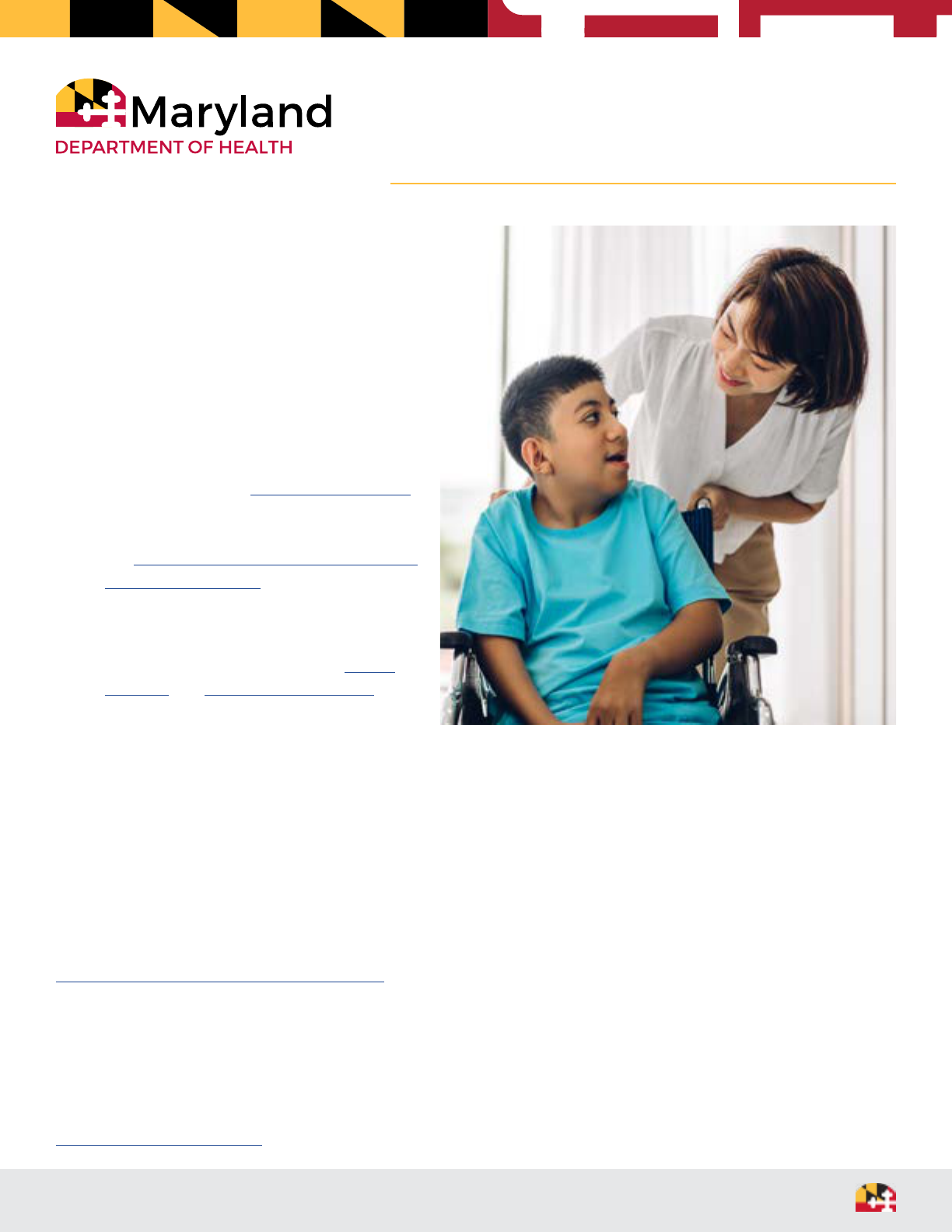
Maryland Developmental
Disabilities Administration
Find Out More:
844-253-8694 | health.maryland.gov/dda
Visit:
201 West Preston Street, Baltimore, MD 21201
Back to Table of Contents
24
GUIDE TO SERVICES FOR
PEOPLE WITH INTELLECTUAL AND
DEVELOPMENTAL DISABILITIES AND FAMILIES
The team members you pick are there to support
you to understand your choices and options so
you can make informed decisions. You may ask
team members to be responsible for some things
you cannot do or do not want to do.
Your team members can best support you by:
1. Participating in the development of your
vision for your life and/or your person-
centered plan (PCP), if you invite them.
2. Learning about the DDA Waiver services.
This can be done by speaking with your
CCS and by listening to webinars held by
the Maryland Community of Practice for
Supporting Families.
3. Learning about self-directed services by
attending the DDA self-direction training
sessions (get information on the DDA’s
Training and Self-Directed Services
webpages), and speaking with your CCS,
DDA Regional Advocacy Specialist and
DDA Regional Self-Direction Lead Staff.
4. Assisting you to visit and select providers based on your need(s) and preferences.
5. If you self-direct your services, assisting you to find and choose employees, vendors, contractors, community
resources and services.
_________________________
Role of the Coordinator of Community Services (CCS)
Coordinators of Community Services (CCS) are independent case managers. They help you identify community-
based services and supports. They also help you understand and complete the DDA Waiver application process
and develop your person-centered plan (PCP).

Maryland Developmental
Disabilities Administration
Find Out More:
844-253-8694 | health.maryland.gov/dda
Visit:
201 West Preston Street, Baltimore, MD 21201
Back to Table of Contents
25
GUIDE TO SERVICES FOR
PEOPLE WITH INTELLECTUAL AND
DEVELOPMENTAL DISABILITIES AND FAMILIES
The goal of the CCS is to support you to choose, plan and participate in services. They encourage and support you
to make your own decisions, stay healthy and safe, participate in the community and have the life you want.
Your CCS will support you to:
1. Work through the person-centered planning process with you and the team members you choose. This will
help you identify what is important to you and important for you when you develop your person-centered plan
(PCP).
2. Help you and your team explore community resources to be an active member in your community.
3. Check to see if you are eligible for Medicaid and the DDA Waiver programs.
4. Understand your choices and options about services and service providers.
5. Complete a Health Risk Screening Tool (HRST) to identify your health status and potential needs.
6. Review the Detailed Service Authorization Tool (DSAT) completed by service providers. The DSAT is a list of
proposed services a provider can offer that can meet your needs. This list is helpful as you think about what
providers to select during your person-centered planning process.
7. Assess your satisfaction and needs by visiting you
at least every three months.
8. Help you schedule an annual meeting with your
team to review and update your PCP.
If you self-direct your services, a CCS will also help by:
1. Working with you and your team to develop the
self-directed budget that will support what is in
your PCP.
2. Sending your PCP and self-directed related
documents to the DDA for review and approval.
3. Helping you and your team learn more about
Support Broker and Financial Management and
Counseling Services (FMCS) supports.
4. Helping you schedule meetings to make changes
to your PCP and/or budget when needed.
5. Helping you to regularly review your spending to be sure you have enough
funds in your budget to pay for your services through the end of the year.
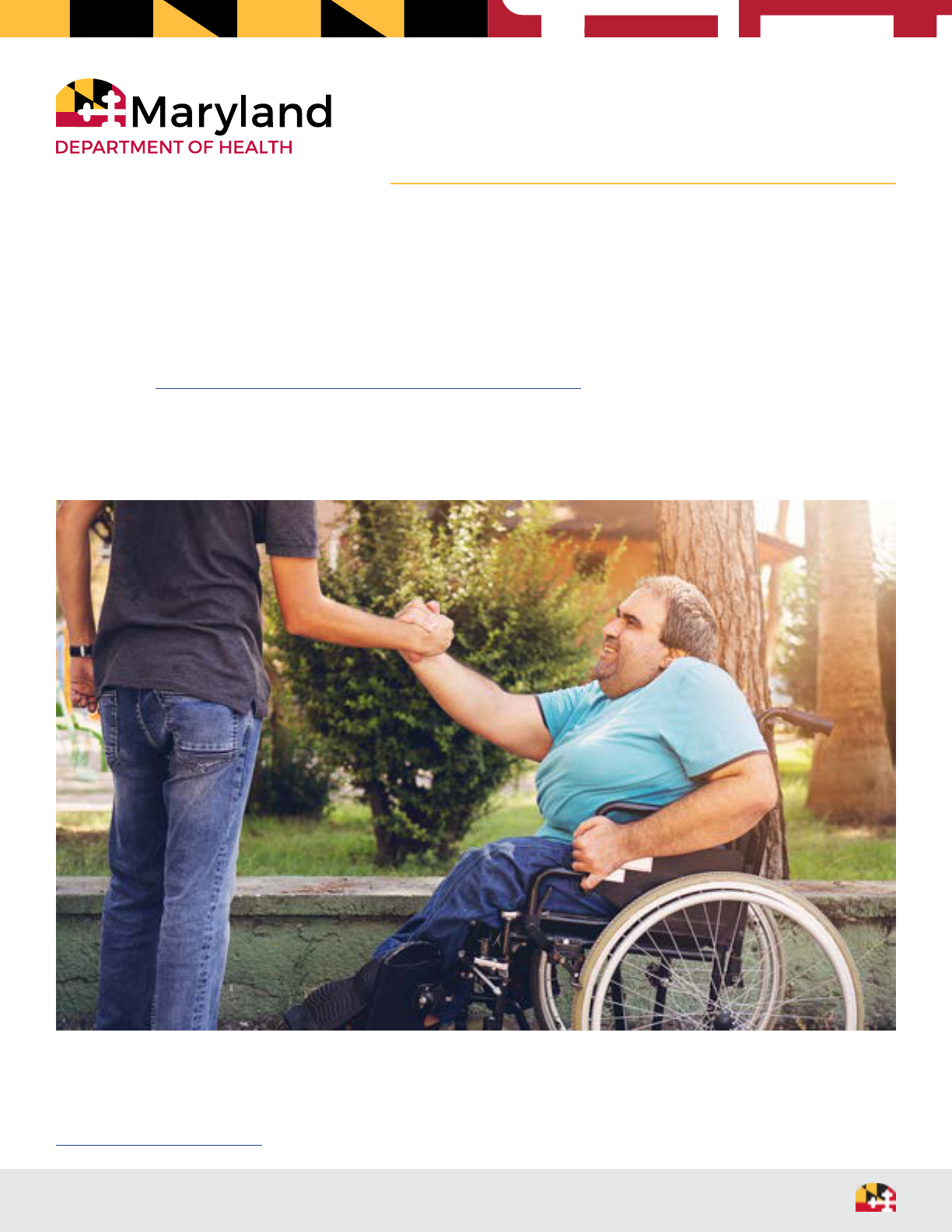
Maryland Developmental
Disabilities Administration
Find Out More:
844-253-8694 | health.maryland.gov/dda
Visit:
201 West Preston Street, Baltimore, MD 21201
Back to Table of Contents
26
GUIDE TO SERVICES FOR
PEOPLE WITH INTELLECTUAL AND
DEVELOPMENTAL DISABILITIES AND FAMILIES
_________________________
Choosing Service Providers
Feeling confident in your choice of service provider(s) is very important. This means you feel like you are making
the best choice based on what you need and want. There are service providers in each region of Maryland. You can
learn more about the providers available by viewing the resources found under the Search for a Provider heading
on the DDA’s Supporting Individuals with Developmental Disabilities webpage.
Support Brokers, available if you chose the self-directed service model, are also included in this resource. Your CCS
also plays an important role in helping you make the best choice. They help you consider your needs, preferences,
and the providers that can meet your needs.

Maryland Developmental
Disabilities Administration
Find Out More:
844-253-8694 | health.maryland.gov/dda
Visit:
201 West Preston Street, Baltimore, MD 21201
Back to Table of Contents
27
GUIDE TO SERVICES FOR
PEOPLE WITH INTELLECTUAL AND
DEVELOPMENTAL DISABILITIES AND FAMILIES
DDA Services
The DDA believes that people with intellectual and developmental disabilities have the right to direct their lives
and services. This person-centered approach guides the DDA in making sure that services support:
• Self-Determination, and the belief that
people can:
• Plan their own lives.
• Make their own decisions.
• Plan and choose their own supports.
• Decide how to spend the funding they have for
services within state and federal rule.
• Take responsibility for the decisions they make.
• Self-Advocacy, and the commitment to
encourage people to:
• Speak up for the things that are important to
them.
• Ask for what is needed or wanted and tell
others about thoughts and feelings.
• Speak up for their rights and make choices and
decisions.
• Supporting Families, and the development of
services and supports that:
• Strengthen their unique abilities to best
nurture, love and support their family member
to live their best life.
• Connect families to support each other.
• Increase access to resources, support and
services across the lifespan.
• Independent Living, and to make sure that
people have:
• The choice of where and how to live.
• Opportunities to use and learn new skills.
• The option to live like people without disabilities.
• Opportunities to make decisions about their life.
• The ability to get involved in activities they
choose.
• Employment, and the commitment to:
• Use each person’s strengths, interests and
skills to support competitive integrated
employment.
• Be an Employment First state.
• Assistive Technology, and providing support
and assistance for people to:
• Explore technology to help meet their needs.
• Increase independence.
• Overcome challenges.
• Become more connected to their
communities.
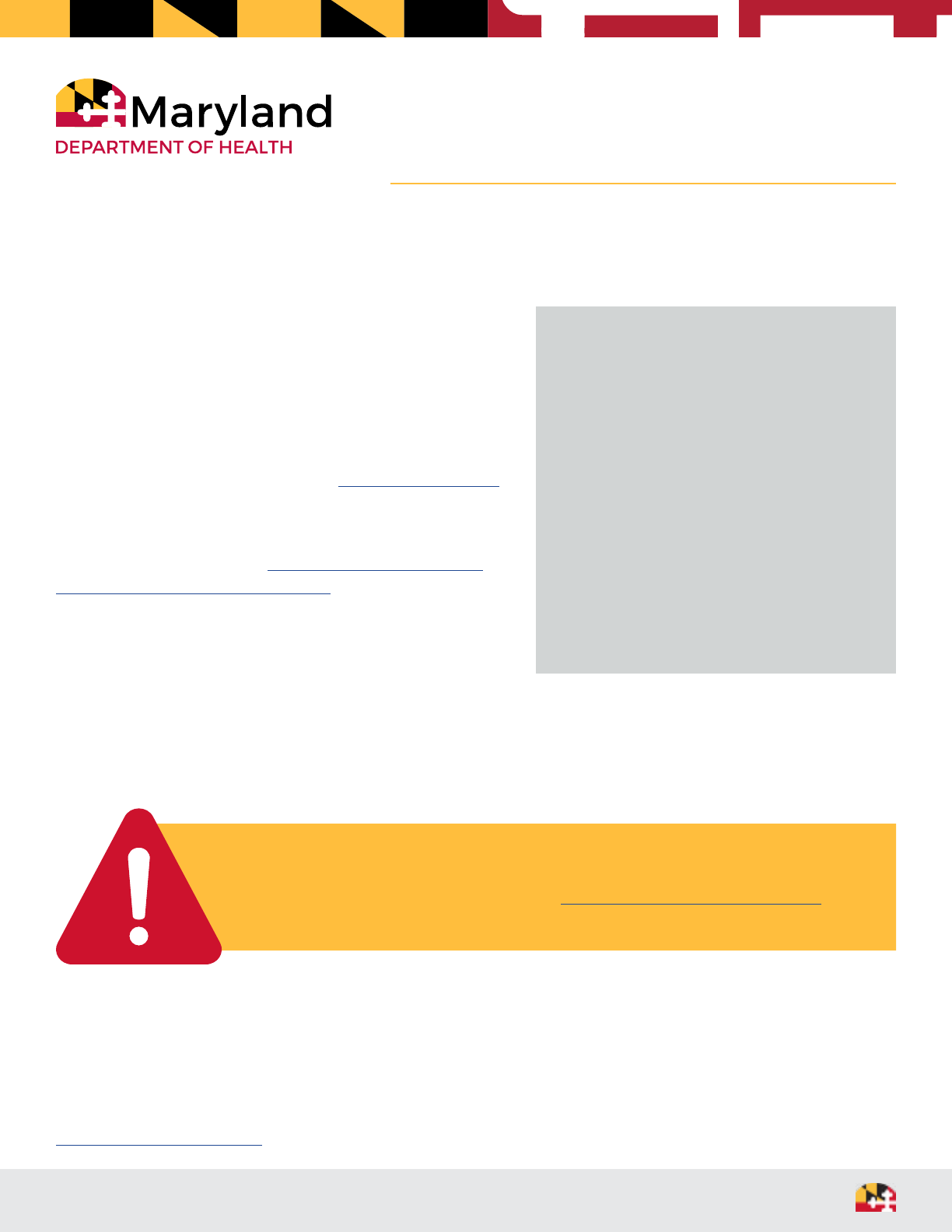
Maryland Developmental
Disabilities Administration
Find Out More:
844-253-8694 | health.maryland.gov/dda
Visit:
201 West Preston Street, Baltimore, MD 21201
Back to Table of Contents
28
GUIDE TO SERVICES FOR
PEOPLE WITH INTELLECTUAL AND
DEVELOPMENTAL DISABILITIES AND FAMILIES
_________________________
Self-Directed Services
You can receive your DDA Waiver services in two different
ways. They are called service models. One way is through a
traditional service model. With traditional services, a licensed
or certified service provider manages your services. The second
way is through a self-directed service model. With self-
directed services, you manage your own supports and recruit
and hire your own staff, known as direct support professionals.
With both options, your CCS and DDA Advocacy Specialists
can help you make informed decisions and develop your
person-centered plan (PCP).
With self-directed services, a Financial Management and
Counseling Services (FMCS) agency helps with employer and
budget related activities such as hiring, accounting and payroll.
You can choose to have a Support Broker. Support Brokers
are optional to help you carry out your responsibilities as an
employer.
When you self-direct your services, you can choose people you know or recruit professionals to work for you. In
the services listed below, you also have the option to hire a relative to be your direct support professional (staff). A
relative is a child, parent, adoptive parent, stepparent or sibling.
SELF-DIRECTION ––––––––––––
You can self-direct some DDA services.
You have employer authority with
some of the services you self-direct,
and budget authority with all services
you self-direct.
Employer authority is managing your
staff. This includes hiring, training,
scheduling, and firing people, if
needed.
Budget authority is making choices
about how you spend the money in
your budget. This includes choosing
the goods and services you want and
who is paid to provide them.
It is important to gather information about both service models so you can make
an informed decision. You can further discuss self-directed services with your
CCS and see the resources on the DDA’s Self-Directed Services Guidance
webpage. This will help you choose the service model that is best for you.

Maryland Developmental
Disabilities Administration
Find Out More:
844-253-8694 | health.maryland.gov/dda
Visit:
201 West Preston Street, Baltimore, MD 21201
Back to Table of Contents
29
GUIDE TO SERVICES FOR
PEOPLE WITH INTELLECTUAL AND
DEVELOPMENTAL DISABILITIES AND FAMILIES
_________________________
Meaningful Day Services
Meaningful Day Services are available if you are 18 years old or older and no longer in high school. These services
provide you with opportunities to:
• Have support on your way to employment.
• Work in competitive integrated employment. This means you earn wages and benefits the same way as
people without disabilities and work where people without disabilities work.
• Develop skills and talents.
• Participate in community life.
Your PCP can include a mix of Meaningful Day Services on the same day if you self-direct your services or if your
traditional model providers bill through LTSSMaryland. Your CCS or service provider can help you understand
this.
Meaningful Day services include:
• Employment Services
Discovery
Job Development
Ongoing Job Supports
Follow Along Supports
Co-Worker Employment Supports
Self-Employment Development Supports
• Career Exploration
• Community Development Service
• Day Habilitation
• Medical Day Care

Maryland Developmental
Disabilities Administration
Find Out More:
844-253-8694 | health.maryland.gov/dda
Visit:
201 West Preston Street, Baltimore, MD 21201
Back to Table of Contents
30
GUIDE TO SERVICES FOR
PEOPLE WITH INTELLECTUAL AND
DEVELOPMENTAL DISABILITIES AND FAMILIES
_________________________
Employment Services
Discovery
• What does this service do? –– This service helps you find out or discover what job may best fit with your
strengths and what you want to do.
• What can you get in this service? –– This service includes an assessment to get to know you and to
develop a plan to set you on your path to finding employment or changing your job. This includes talking to
you about things you like, things you have tried, new things you may like to try, and what support you may
need to do your job well.
• Who can get this service? –– This service is for people who:
Are out of high school.
Are 18 years of age or older.
Want a job or want to find a new or different job.
Have looked at services available through the Maryland Medicaid State Plan, Division of Rehabilitation
Services (DORS), the State Department of Education and the Department of Human Services.
• Self-Direct Option
Budget Authority.
• DDA Waivers that offer this service:
• Community Supports Waiver.
• Community Pathway Waiver.

Maryland Developmental
Disabilities Administration
Find Out More:
844-253-8694 | health.maryland.gov/dda
Visit:
201 West Preston Street, Baltimore, MD 21201
Back to Table of Contents
31
GUIDE TO SERVICES FOR
PEOPLE WITH INTELLECTUAL AND
DEVELOPMENTAL DISABILITIES AND FAMILIES
_________________________
Job Development
• What does this service do? –– This service supports you to identify a job that is right for you, apply for a job,
and prepare for the interview.
• What can you get in this service? –– This service includes support for customized employment and
exploring self-employment. Customized employment is a way of identifying a job by understanding the
needs of both the employer and the person who wants a job. Self-employment is working for yourself and
not someone else.
• Who can get this service? –– This service is for people who:
Are out of high school.
Are 18 years of age or older.
Have looked at services available through the Maryland Medicaid State Plan, Division of Rehabilitation
Services (DORS), the State Department of Education and the Department of Human Services.
Have an interest in Employment Services to find a job or find a different job.
• Self-Direct Option
Budget Authority.
• DDA Waivers that offer this service:
• Community Supports Waiver.
• Community Pathway Waiver.

Maryland Developmental
Disabilities Administration
Find Out More:
844-253-8694 | health.maryland.gov/dda
Visit:
201 West Preston Street, Baltimore, MD 21201
Back to Table of Contents
32
GUIDE TO SERVICES FOR
PEOPLE WITH INTELLECTUAL AND
DEVELOPMENTAL DISABILITIES AND FAMILIES
_________________________
Ongoing Job Supports
• What does this service do? –– This service supports you when you start a new job. It helps you learn and
complete your tasks while at work; learn new tasks after a promotion or significant changes in duties; and/or
when there are other changes at work.
• What can you get in this service? –– Support is based on what you need. It may include: job coaching;
teaching someone who works with you to support you as needed; ongoing hands-on job supports; step-
by-step instruction; helping you learn your commute; and personal care assistance, behavioral supports, or
delegated nursing tasks, if needed.
• Who can get this service? –– This service is for people who:
Are out of high school.
Are 18 years of age or older.
Have looked at services available through the Maryland Medicaid State Plan, Division of Rehabilitation
Services (DORS), the State Department of Education and the Department of Human Services.
Have an interest and need for ongoing job supports to keep your job.
Have a competitive and integrated job.
• Self-Direct Option
Budget Authority.
Employer Authority.
• DDA Waivers that offer this service:
• Community Supports Waiver.
• Community Pathway Waiver.

Maryland Developmental
Disabilities Administration
Find Out More:
844-253-8694 | health.maryland.gov/dda
Visit:
201 West Preston Street, Baltimore, MD 21201
Back to Table of Contents
33
GUIDE TO SERVICES FOR
PEOPLE WITH INTELLECTUAL AND
DEVELOPMENTAL DISABILITIES AND FAMILIES
_________________________
Follow Along Supports
• What does this service do? –– This service supports you when you know how to complete your daily job tasks
but need someone, other than your supervisor, to talk to when you have questions or concerns. This service is in-
person at least twice a month. Staff can also be available by phone or computer to check-in with you as needed.
• What can you get in this service? –– Support is based on what you need. It may include: job coaching;
teaching someone who works with you to support you as needed; ongoing hands-on job supports; step-
by-step instruction; helping you learn your commute; and personal care assistance, behavioral supports, or
delegated nursing tasks, if needed.
• Who can get this service? –– This service is for people who:
Are out of high school.
Are 18 years of age or older.
Have looked at services available through the Maryland Medicaid State Plan, Division of Rehabilitation
Services (DORS), the State Department of Education and the Department of Human Services.
Have an interest and need for ongoing job supports to keep your job.
Have a competitive and integrated job.
• Self-Direct Option
Budget Authority.
Employer Authority.
• DDA Waivers that offer this service:
• Community Supports Waiver.
• Community Pathway Waiver.

Maryland Developmental
Disabilities Administration
Find Out More:
844-253-8694 | health.maryland.gov/dda
Visit:
201 West Preston Street, Baltimore, MD 21201
Back to Table of Contents
34
GUIDE TO SERVICES FOR
PEOPLE WITH INTELLECTUAL AND
DEVELOPMENTAL DISABILITIES AND FAMILIES
_________________________
Co-Worker Employment Supports
• What does this service do? –– A co-worker provides this service during the first three months at your job.
This can provide you with help with things like completing your orientation and training.
• What can you get in this service? –– Support with completing your employer’s orientation and training.
• Who can get this service? –– This service is for people who:
Are out of high school.
Are 18 years of age or older.
Have looked at services available through the Maryland Medicaid State Plan, Division of Rehabilitation
Services (DORS), the State Department of Education and the Department of Human Services.
Have an interest and need for co-worker employment supports to keep your job.
• Self-Direct Option
Budget Authority.
• DDA Waivers that offer this service:
• Community Supports Waiver.
• Community Pathway Waiver.

Maryland Developmental
Disabilities Administration
Find Out More:
844-253-8694 | health.maryland.gov/dda
Visit:
201 West Preston Street, Baltimore, MD 21201
Back to Table of Contents
35
GUIDE TO SERVICES FOR
PEOPLE WITH INTELLECTUAL AND
DEVELOPMENTAL DISABILITIES AND FAMILIES
_________________________
Self-Employment Development Supports
• What does this service do? –– This service supports you to develop a business and marketing plan to set
up your own business. You cannot use this service to start or operate your business.
• What can you get in this service? –– This service provides assistance in the development of a business and
marketing plan for your own business. These plan can include potential sources of business financing and
other assistance in developing and starting a business.
• Who can get this service? –– This service is for people who:
Are out of high school.
Are 18 years of age or older.
Have looked at services available through the Maryland Medicaid State Plan, Division of Rehabilitation
Services (DORS), the State Department of Education and the Department of Human Services.
Have completed the three phases of Discovery employment services and are interested in self-
employment.
• Self-Direct Option
Budget Authority.
• DDA Waivers that offer this service:
• Community Supports Waiver.
• Community Pathway Waiver.

Maryland Developmental
Disabilities Administration
Find Out More:
844-253-8694 | health.maryland.gov/dda
Visit:
201 West Preston Street, Baltimore, MD 21201
Back to Table of Contents
36
GUIDE TO SERVICES FOR
PEOPLE WITH INTELLECTUAL AND
DEVELOPMENTAL DISABILITIES AND FAMILIES
_________________________
Career Exploration
What does this service do?
This is a short-term service to help you learn new skills you will need in a competitive and integrated job you are
interested in.
What can you get in this service?
You can get direct support, personal care assistance, nursing support services and transportation if needed for you
to participate in this service.
Who can get this service?
This service is for people who:
Are out of high school.
Are 18 years of age or older.
Have been working under a supported employment contract or have been working in a situation or setting
that is not competitive or integrated (prior to 2018).
Have an employment goal in your PCP that describes your interest in competitive integrated employment.
Self-Direct Option
None.
DDA Waivers that offer this service:
• Community Supports Waiver.
• Community Pathway Waiver.

Maryland Developmental
Disabilities Administration
Find Out More:
844-253-8694 | health.maryland.gov/dda
Visit:
201 West Preston Street, Baltimore, MD 21201
Back to Table of Contents
37
GUIDE TO SERVICES FOR
PEOPLE WITH INTELLECTUAL AND
DEVELOPMENTAL DISABILITIES AND FAMILIES
_________________________
Community Development Service
What does this service do?
This service supports you to be more connected to your community. Staff will support you to develop or maintain
social and other skills you need to feel confident interacting with all types of people in your community.
What can you get in this service?
You can get direct support, personal care assistance, nursing support services and transportation if needed for you
to participate in this service.
If you self-direct this service, it includes training for your direct support staff; travel reimbursement; benefits; and
leave time.
Who can get this service?
This service is for people who:
Are out of high school.
Are 18 years of age or older.
Have looked at services available through the Maryland Medicaid State Plan, Division of Rehabilitation
Services (DORS), the State Department of Education and the Department of Human Services.
Self-Direct Option
Budget Authority.
Employer Authority.
DDA Waivers that offer this service:
• Community Supports Waiver.
• Community Pathway Waiver.

Maryland Developmental
Disabilities Administration
Find Out More:
844-253-8694 | health.maryland.gov/dda
Visit:
201 West Preston Street, Baltimore, MD 21201
Back to Table of Contents
38
GUIDE TO SERVICES FOR
PEOPLE WITH INTELLECTUAL AND
DEVELOPMENTAL DISABILITIES AND FAMILIES
_________________________
Day Habilitation
What does this service do?
This service supports you to build skills and participate in social and community activities. Support is provided in
small and large groups of people. It is provided in provider programs or in the community.
What can you get in this service?
You can get direct support, personal care assistance, nursing support services, and transportation if needed for you
to participate in this service.
Who can get this service?
This service is for people who:
Are out of high school.
Are 18 years of age or older.
Have looked at services available through the Maryland Medicaid State Plan, Division of Rehabilitation
Services (DORS), the State Department of Education and the Department of Human Services.
Self-Direct Option
Budget Authority.
DDA Waivers that offer this service:
• Community Supports Waiver.
• Community Pathway Waiver.

Maryland Developmental
Disabilities Administration
Find Out More:
844-253-8694 | health.maryland.gov/dda
Visit:
201 West Preston Street, Baltimore, MD 21201
Back to Table of Contents
39
GUIDE TO SERVICES FOR
PEOPLE WITH INTELLECTUAL AND
DEVELOPMENTAL DISABILITIES AND FAMILIES
_________________________
Medical Day Care
What does this service do?
This service supports you to participate in a group program that provides health care, nursing, physical therapy,
occupational therapy, nutrition, personal care, social and related activities. This is in provider programs or in the
community.
What can you get in this service?
Skilled nursing, nursing assessments, social work services, therapy, personal care and transportation are included if
needed for you to participate in this service. This service also includes medication monitoring, help with preparing
and eating meals, daily living skills training and nutrition services.
Who can get this service?
This service is for people who:
Are 16 years of age or older.
Meet the level of care for nursing facility services.
Self-Direct Option
None.
DDA Waivers that offer this service:
• Community Supports Waiver.
• Community Pathway Waiver.

Maryland Developmental
Disabilities Administration
Find Out More:
844-253-8694 | health.maryland.gov/dda
Visit:
201 West Preston Street, Baltimore, MD 21201
Back to Table of Contents
40
GUIDE TO SERVICES FOR
PEOPLE WITH INTELLECTUAL AND
DEVELOPMENTAL DISABILITIES AND FAMILIES
_________________________
Support Services
Support Services are services that support parts of your life that are not supported with Meaningful Day or
Residential Services. These services can provide you with:
• Access to Assistive Technology.
• Opportunities to learn about, assess the need for, and develop positive behavioral support strategies.
• Support your family or caregivers through training, mentoring or respite.
• Access nursing supports.
• Access personal supports to help you participate in your home and community life.
Support Services include the following:
• Assistive Technology Service
• Behavioral Support Services
• Environmental Assessment
• Environmental Modifications
• Family Caregiver Training and Empowerment
Services
• Family and Peer Mentoring Supports
• Housing Support Services
• Individual and Family-Directed Goods and
Services (IFDGS)
• Live-in Caregiver Support
• Nursing Support Services
• Participant Education, Training and Advocacy
Supports
• Personal Supports
• Remote Support Services
• Respite Care Services
• Support Broker Services
• Transition Services
• Transportation
• Vehicle Modifications

Maryland Developmental
Disabilities Administration
Find Out More:
844-253-8694 | health.maryland.gov/dda
Visit:
201 West Preston Street, Baltimore, MD 21201
Back to Table of Contents
41
GUIDE TO SERVICES FOR
PEOPLE WITH INTELLECTUAL AND
DEVELOPMENTAL DISABILITIES AND FAMILIES
_________________________
Assistive Technology Service
What does this service do?
This service supports you to maintain or improve your independent skills. This includes improving interactions,
supporting meaningful relationships, and increasing your ability to live independently and be an active member of
your community.
What can you get in this service?
Assistive Technology is a device or piece of equipment that helps you maintain or improve how you function in life.
Examples include technology that assists with speech and communication; visual or hearing support; computer
and phone devices; equipment that helps you with independent living in your home; and adapted toys and
specialized equipment.
This service includes an assessment of your technology needs and helps to select, get, use and maintain the
technology.
Who can get this service?
You may access assistive technology based on your assessed need for the technology. Based on your assessed
need, if the assistive technology you need is more than $2,500 you must:
Have documentation that the assistive technology meets your support needs.
Have documentation that another funding source cannot pay for the technology you need.
Show that the state or federal government approves of the technology.
Self-Direct Option
Budget Authority.
DDA Waivers that offer this service:
• Family Supports Waiver.
• Community Supports Waiver.
• Community Pathway Waiver.

Maryland Developmental
Disabilities Administration
Find Out More:
844-253-8694 | health.maryland.gov/dda
Visit:
201 West Preston Street, Baltimore, MD 21201
Back to Table of Contents
42
GUIDE TO SERVICES FOR
PEOPLE WITH INTELLECTUAL AND
DEVELOPMENTAL DISABILITIES AND FAMILIES
_________________________
Behavioral Support Services
What does this service do?
These services support you if you are experiencing, or are likely to experience difficulty at home or in the
community as a result of behavioral, psychological, social or emotional challenges.
What can you get in this service?
Based on your need, this service includes behavioral assessment, consultation and development of a behavior
plan. It also can include Brief Support Implementation Services (BSIS). BSIS is a time-limited service that provides
direct assistance and modeling to your family, staff, and caregivers so they can support you with your behavioral,
psychological and emotional needs.
Who can get this service?
This service is for people who:
Have a documented need or history of behavior that makes it difficult to participate in community activities
or live independently, or had a significant life event that has an impact on their well-being.
Talk with your CCS about other requirements to get this service.
Self-Direct Option
Budget Authority.
DDA Waivers that offer this service:
• Family Supports Waiver.
• Community Supports Waiver.
• Community Pathways Waiver.

Maryland Developmental
Disabilities Administration
Find Out More:
844-253-8694 | health.maryland.gov/dda
Visit:
201 West Preston Street, Baltimore, MD 21201
Back to Table of Contents
43
GUIDE TO SERVICES FOR
PEOPLE WITH INTELLECTUAL AND
DEVELOPMENTAL DISABILITIES AND FAMILIES
_________________________
Environmental Assessment
What does this service do?
This service is an assessment with you at your home to see if changes to your home or assistive technology are
needed to support your independence, health or safety.
What can you get in this service?
A professional assessment from an Occupational Therapist of your needs.
Who can get this service?
This service is for people who:
Have challenges getting around and using different parts of their home.
Have looked at services available through the Maryland Medicaid State Plan, Division of Rehabilitation
Services (DORS), the State Department of Education and the Department of Human Services.
Self-Direct Option
Budget Authority.
DDA Waivers that offer this service:
• Family Supports Waiver.
• Community Supports Waiver.
• Community Pathways Waiver.

Maryland Developmental
Disabilities Administration
Find Out More:
844-253-8694 | health.maryland.gov/dda
Visit:
201 West Preston Street, Baltimore, MD 21201
Back to Table of Contents
44
GUIDE TO SERVICES FOR
PEOPLE WITH INTELLECTUAL AND
DEVELOPMENTAL DISABILITIES AND FAMILIES
_________________________
Environmental Modifications
What does this service do?
This service supports you to add or change something in your home so that you can be more independent. It may
also help you make your home safer and healthier.
What can you get in this service?
Based on your need, this service includes small changes to your home like grab bars, ramps, railings, warnings on
walking surfaces, alert devices, and adaptations to electrical, phone and lighting systems.
Who can get this service?
This service is for people who:
Have accessibility needs.
Have looked at services available through the Maryland Medicaid State Plan, Division of Rehabilitation
Services (DORS), the State Department of Education and the Department of Human Services.
Have approval for this service from a property manager or homeowner (if not owned by the person needing
the service).
Will live in the home for at least one (1) year.
Self-Direct Option
Budget Authority.
DDA Waivers that offer this service:
• Family Supports Waiver.
• Community Supports Waiver.
• Community Pathways Waiver.

Maryland Developmental
Disabilities Administration
Find Out More:
844-253-8694 | health.maryland.gov/dda
Visit:
201 West Preston Street, Baltimore, MD 21201
Back to Table of Contents
45
GUIDE TO SERVICES FOR
PEOPLE WITH INTELLECTUAL AND
DEVELOPMENTAL DISABILITIES AND FAMILIES
_________________________
Family Caregiver Training and Empowerment Services
What does this service do?
These services cover educational materials, training programs, workshops and conferences that help your unpaid
family caregiver: understand your disability; get better at providing supports; identify community resources and
supports; develop or improve parenting skills; develop advocacy skills; and support your caregiver in developing
advocacy skills.
What can you get in this service?
This service can include educational materials, training programs, workshops and conference registration costs.
This does not include the cost of travel, meals or overnight lodging. What your unpaid family caregiver can get
depends on their needs.
Who can get this service?
This service is for people who:
Have support, training, companionship, or supervision through an unpaid family member.
Have looked at services available through the Maryland Medicaid State Plan, Division of Rehabilitation
Services (DORS), the State Department of Education and the Department of Human Services.
Self-Direct Option
Budget Authority.
DDA Waivers that offer this service:
• Family Supports Waiver.
• Community Supports Waiver.
• Community Pathways Waiver.

Maryland Developmental
Disabilities Administration
Find Out More:
844-253-8694 | health.maryland.gov/dda
Visit:
201 West Preston Street, Baltimore, MD 21201
Back to Table of Contents
46
GUIDE TO SERVICES FOR
PEOPLE WITH INTELLECTUAL AND
DEVELOPMENTAL DISABILITIES AND FAMILIES
_________________________
Family and Peer Mentoring Supports
What does this service do?
This service connects you and your family to mentors with experiences like yours. They explain community
services, programs and strategies they have used to achieve goals. This can help you and/or your family members
learn about and access community resources beyond those offered through the DDA Waivers.
What can you get in this service?
This service can include supporting you and your family to connect with a mentor and any follow-up support that
may be needed to ensure a good match. This service also includes peer supports for siblings.
Who can get this service?
This service is for people who:
Have a need for this service documented in their PCP.
Have looked at services available through the Maryland Medicaid State Plan, Division of Rehabilitation
Services (DORS), the State Department of Education and the Department of Human Services.
Self-Direct Option
Budget Authority.
DDA Waivers that offer this service:
• Family Supports Waiver.
• Community Supports Waiver.
• Community Pathways Waiver.

Maryland Developmental
Disabilities Administration
Find Out More:
844-253-8694 | health.maryland.gov/dda
Visit:
201 West Preston Street, Baltimore, MD 21201
Back to Table of Contents
47
GUIDE TO SERVICES FOR
PEOPLE WITH INTELLECTUAL AND
DEVELOPMENTAL DISABILITIES AND FAMILIES
_________________________
Housing Support Services
What does this service do?
These services provide you with information about and support with getting and keeping independent housing.
What can you get in this service?
This service includes housing information, assistance, transition and tenancy sustaining services. The Housing
Information and Assistance part of this service helps you get independent housing. The Housing Transition
Services assess your housing needs and develops an individualized housing support plan. The Housing Tenancy
Sustaining Services help you stay in the home you rent.
Who can get this service?
This service is for people who:
Are 18 years old or older.
Have the need for this service as described in your PCP. This may include barriers to housing, housing goals,
strategies to address barriers and your current supports
Have looked at services available through the Maryland Medicaid State Plan, Division of Rehabilitation
Services (DORS), the State Department of Education and the Department of Human Services.
Self-Direct Option
Budget Authority.
DDA Waivers that offer this service:
• Family Supports Waiver.
• Community Supports Waiver.
• Community Pathways Waiver.

Maryland Developmental
Disabilities Administration
Find Out More:
844-253-8694 | health.maryland.gov/dda
Visit:
201 West Preston Street, Baltimore, MD 21201
Back to Table of Contents
48
GUIDE TO SERVICES FOR
PEOPLE WITH INTELLECTUAL AND
DEVELOPMENTAL DISABILITIES AND FAMILIES
_________________________
Individual and Family-Directed Goods and Services
(IFDGS)
What does this service do?
If you self-direct your services, you can purchase equipment or supplies that relate to a need or goal identified in
your PCP, maintain or increase your independence, or promote opportunities for you to participate in community
living that are not available through a Waiver service, Medicaid State Plan or another source. This includes up to
$500 that you may choose to use to support staff recruitment and advertising efforts. You can use the money for
staff recruitment to develop and print flyers and use staffing registries.
What can you get in this service?
There are limits to what is covered. Please refer to the “What does this service do?” section above and talk with
your CCS for more information.
Who can get this service?
This service is for people who:
Self-direct services.
Have unused funds in their self-directed budget (not including the $500 to support staff recruitment).
Have documented the need for this service in your Person-Centered plan. Please talk to your CCS for
additional documentation requirements.
Self-Direct Option
Budget Authority.
DDA Waivers that offer this service:
• Family Supports Waiver.
• Community Supports Waiver.
• Community Pathways Waiver.

Maryland Developmental
Disabilities Administration
Find Out More:
844-253-8694 | health.maryland.gov/dda
Visit:
201 West Preston Street, Baltimore, MD 21201
Back to Table of Contents
49
GUIDE TO SERVICES FOR
PEOPLE WITH INTELLECTUAL AND
DEVELOPMENTAL DISABILITIES AND FAMILIES
_________________________
Live-in Caregiver Support
What does this service do?
This service helps cover the cost of rent and food for someone who provides supports and services to you while
they live in your home.
What can you get in this service?
Direct support from a person that you offer to cover their cost of rent and food.
Who can get this service?
This service is for people who:
Do not receive the Personal Supports, Community Living-Group Home or Enhanced Supports, Supported
Living or Shared Living Services.
Have proof of a valid rental agreement or home ownership.
Do not live in the home of a family member, a caregiver, or in a home that is owned or leased by a DDA
provider.
Have discussed with their CCS the other requirements to participate in this service.
Self-Direct Option
Budget Authority.
DDA Waiver that offers this service:
• Community Pathways Waiver.

Maryland Developmental
Disabilities Administration
Find Out More:
844-253-8694 | health.maryland.gov/dda
Visit:
201 West Preston Street, Baltimore, MD 21201
Back to Table of Contents
50
GUIDE TO SERVICES FOR
PEOPLE WITH INTELLECTUAL AND
DEVELOPMENTAL DISABILITIES AND FAMILIES
_________________________
Nursing Support Services
What does this service do?
Based on your assessed need, this service supports a registered nurse licensed in Maryland to provide Nursing
Consultation, Health Case Management and Nursing Delegation services.
What can you get in this service?
An initial nursing assessment includes a clinical review/update to your Health Risk Screening Tool (HRST). The HRST
asks questions about a person’s health, behavior needs and risk factors. This can include whether you can take
medication without support.
Nursing Consultation can help to access health services and supports. This can include the creation or review of
ways to support you to be healthy and to communicate with your team.
Health Case Management can help to access health services and supports, the creation of a Nursing Care Plan,
and training staff who support you.
Nursing Delegation can include help to access health services and supports, the creation of a Nursing Care Plan,
training and monitoring staff who support you, and ongoing monitoring of your health and nursing services.
NOTE: Nursing Support Services do not include any direct nursing care to you.
Who can get this service?
This service is for people who:
Have an assessed need.
Do not have access to this service through other programs such as Rare and Expensive Case Management
(REM).
Self-Direct Option
Budget Authority.
Employer Authority (some services).
DDA Waivers that offer this service:
• Family Supports Waiver.
• Community Supports Waiver.
• Community Pathways Waiver.

Maryland Developmental
Disabilities Administration
Find Out More:
844-253-8694 | health.maryland.gov/dda
Visit:
201 West Preston Street, Baltimore, MD 21201
Back to Table of Contents
51
GUIDE TO SERVICES FOR
PEOPLE WITH INTELLECTUAL AND
DEVELOPMENTAL DISABILITIES AND FAMILIES
_________________________
Participant Education, Training and Advocacy Supports
What does this service do?
This service covers the cost of a training program, workshop, or conference you need to attend to learn more
about how to develop self-advocacy skills, exercise your civil rights and develop skills needed to control and be
responsible for your services.
What can you get in this service?
Based on your need, this service can include the training program enrollment fees, conferences, and workshops;
books and educational materials; and transportation that helps you to attend and participate. This does not
include tuition, airfare, the cost of meals or overnight lodging.
Who can get this service?
This service is for people who:
Have documented the need for this service in their PCP.
Have looked at services available through the Maryland Medicaid State Plan, Division of Rehabilitation
Services (DORS), the State Department of Education and the Department of Human Services.
Self-Direct Option
Budget Authority.
Employer Authority.
DDA Waivers that offer this service:
• Family Supports Waiver.
• Community Supports Waiver.
• Community Pathways Waiver.

Maryland Developmental
Disabilities Administration
Find Out More:
844-253-8694 | health.maryland.gov/dda
Visit:
201 West Preston Street, Baltimore, MD 21201
Back to Table of Contents
52
GUIDE TO SERVICES FOR
PEOPLE WITH INTELLECTUAL AND
DEVELOPMENTAL DISABILITIES AND FAMILIES
_________________________
Personal Supports
What does this service do?
This service helps with different kinds of support needs if you live in your own or your family’s home and would like
to improve your independent living skills.
What can you get in this service?
Based on your need, this service includes support for you in your home and support to participate in the community.
It also includes personal care assistance. Please discuss the personal care assistance options with your CCS.
If you self-direct your services, this service includes the cost to train direct support staff, staff travel costs, benefits and
leave time.
Who can get this service?
This service is for people who:
Live in their own home or their family’s home.
Have needs that are not met through family or natural supports in their PCP.
Have looked at services available through the Maryland Medicaid State Plan, Division of Rehabilitation
Services (DORS), the State Department of Education and the Department of Human Services.
Have talked with their CCS about other requirements for this service.
Self-Direct Option
Budget Authority.
Employer Authority.
DDA Waivers that offer this service:
• Family Supports Waiver.
• Community Supports Waiver.
• Community Pathways Waiver.

Maryland Developmental
Disabilities Administration
Find Out More:
844-253-8694 | health.maryland.gov/dda
Visit:
201 West Preston Street, Baltimore, MD 21201
Back to Table of Contents
53
GUIDE TO SERVICES FOR
PEOPLE WITH INTELLECTUAL AND
DEVELOPMENTAL DISABILITIES AND FAMILIES
_________________________
Remote Support Services
What does this service do?
This service supports your independence in your home so that you don’t have to rely on staff. Staff can be available
to you as needed and check-in through technology instead of being where you are.
What can you get in this service?
This service is based on your assessed need and the technology that may work best for you. It can include system
installation, repair, maintenance, and a back-up system; training and technical assistance for you and your support
team; off-site system monitoring staff; and stand-by supports to notify police, fire, and back-up support staff, if
needed.
Who can get this service?
This service is for people who:
Are 18 years old or older.
Do not receive Community Living-Enhanced Supports or Shared Living services.
Have documented in their PCP the need for this service and discussed other requirements with their CCS.
Self-Direct Option
Budget Authority.
DDA Waiver that offers this service:
• Community Pathways Waiver.

Maryland Developmental
Disabilities Administration
Find Out More:
844-253-8694 | health.maryland.gov/dda
Visit:
201 West Preston Street, Baltimore, MD 21201
Back to Table of Contents
54
GUIDE TO SERVICES FOR
PEOPLE WITH INTELLECTUAL AND
DEVELOPMENTAL DISABILITIES AND FAMILIES
_________________________
Respite Care Services
What does this service do?
This service is short-term support that gives you and your family, or other primary caregiver, a break from daily
routines. It is a one-to-one service.
What can you get in this service?
Respite is provided in: your home; a respite care provider’s home; a licensed residential site; state certified
overnight or youth camps; or other places and camps approved by the DDA. This does not include fees related to
respite like membership fees at a recreational facility, community activities or insurance.
Who can get this service?
This service is for people who:
Live in their own home or in their family home.
Do not receive Community Living-Group Home, Community Living-Enhanced Supports or Shared Living
services.
Have documented in their PCP the need for this service and discussed other requirements with their CSS.
Self-Direct Option
Budget Authority.
Employer Authority.
DDA Waivers that offer this service:
• Family Supports Waiver.
• Community Supports Waiver.
• Community Pathways Waiver.

Maryland Developmental
Disabilities Administration
Find Out More:
844-253-8694 | health.maryland.gov/dda
Visit:
201 West Preston Street, Baltimore, MD 21201
Back to Table of Contents
55
GUIDE TO SERVICES FOR
PEOPLE WITH INTELLECTUAL AND
DEVELOPMENTAL DISABILITIES AND FAMILIES
_________________________
Support Broker Services
What does this service do?
If you self-direct your services, you can choose this service. A Support Broker is an optional service that can provide
employer-related information and advice for a participant in support of self-direction to make informed decisions
related to day-to-day management of staff providing services within the available budget.
What can you get in this service?
This service can provide coaching and mentoring on your responsibilities of being the employer of your services. It
can include information, coaching and mentoring about benefits and leave time.
Who can get this service?
This service is for people who:
Self-direct their services.
Document the need for this service in their PCP.
Self-Direct Option
Budget Authority.
Employer Authority.
DDA Waivers that offer this service:
• Family Supports Waiver.
• Community Supports Waiver.
• Community Pathways Waiver.

Maryland Developmental
Disabilities Administration
Find Out More:
844-253-8694 | health.maryland.gov/dda
Visit:
201 West Preston Street, Baltimore, MD 21201
Back to Table of Contents
56
GUIDE TO SERVICES FOR
PEOPLE WITH INTELLECTUAL AND
DEVELOPMENTAL DISABILITIES AND FAMILIES
_________________________
Transition Services
What does this service do?
This service provides funding for certain expenses if you move from an institutional setting to a group home or
from a provider operated home to your own home in the community.
What can you get in this service?
This service includes expenses like security deposits; fees or other deposits needed to set up utilities; and moving
expenses. Please talk with your CCS about what this service does not include.
Who can get this service?
This service is for people who:
Are moving from an institutional setting to a group home or provider residence to their own home in the
community.
Have documented in their PCP the need for this service in their PCP and discussed other requirements
with their CCS.
Have looked at services available through the Maryland Medicaid State Plan, Division of Rehabilitation
Services (DORS), the State Department of Education and the Department of Human Services.
Self-Direct Option
Budget Authority.
DDA Waiver that offers this service:
• Community Pathways Waiver.

Maryland Developmental
Disabilities Administration
Find Out More:
844-253-8694 | health.maryland.gov/dda
Visit:
201 West Preston Street, Baltimore, MD 21201
Back to Table of Contents
57
GUIDE TO SERVICES FOR
PEOPLE WITH INTELLECTUAL AND
DEVELOPMENTAL DISABILITIES AND FAMILIES
_________________________
Transportation
What does this service do?
This service helps you independently get to community activities. Your community is where you live, work, shop or
spend your days. The service is provided based on the assessed need for this service in your PCP.
What can you get in this service?
This service can include learning how to move safely around the community; using mobility and volunteer
transportation services; travel training, and mileage reimbursement for transportation provided by another person
using their own car. It does not include travel to vacation locations or any travel that does not support community
living.
Who can get this service?
This service is for people who:
Have documented in their PCP the type and frequency of transportation services needed.
Have looked at services available through the Maryland Medicaid State Plan, Division of Rehabilitation
Services (DORS), the State Department of Education and the Department of Human Services.
Self-Direct Option
Budget Authority.
DDA Waivers that offer this service:
• Family Supports Waiver.
• Community Supports Waiver.
• Community Pathways Waiver.

Maryland Developmental
Disabilities Administration
Find Out More:
844-253-8694 | health.maryland.gov/dda
Visit:
201 West Preston Street, Baltimore, MD 21201
Back to Table of Contents
58
GUIDE TO SERVICES FOR
PEOPLE WITH INTELLECTUAL AND
DEVELOPMENTAL DISABILITIES AND FAMILIES
_________________________
Vehicle Modifications
What does this service do?
This service covers the cost to you or your family to modify (change) your vehicle so that it is more accessible. It can
also help cover the cost of repairs to the vehicle modification.
What can you get in this service?
This service may include an assessment to determine your specific needs as a driver or passenger. It may also
include help to buy or install the modifications in a vehicle:
• You own or a new vehicle you purchase, or
• Owned or purchased by a legally responsible parent of a minor or other caregiver as approved by DDA.
It may include repairs that are not under a vehicle’s modification warranty and training on the use of the
modification.
Who can get this service?
This service is for people who:
Have proof of vehicle registration or ownership or a legally responsible parent of a minor or other primary
caregiver may own the vehicle.
Have talked to their CCS about required need and documentation.
Have looked at services available through the Maryland Medicaid State Plan, Division of Rehabilitation
Services (DORS), the State Department of Education and the Department of Human Services.
Self-Direct Option
Budget Authority.
DDA Waivers that offer this service:
• Family Supports Waiver.
• Community Supports Waiver.
• Community Pathways Waiver.
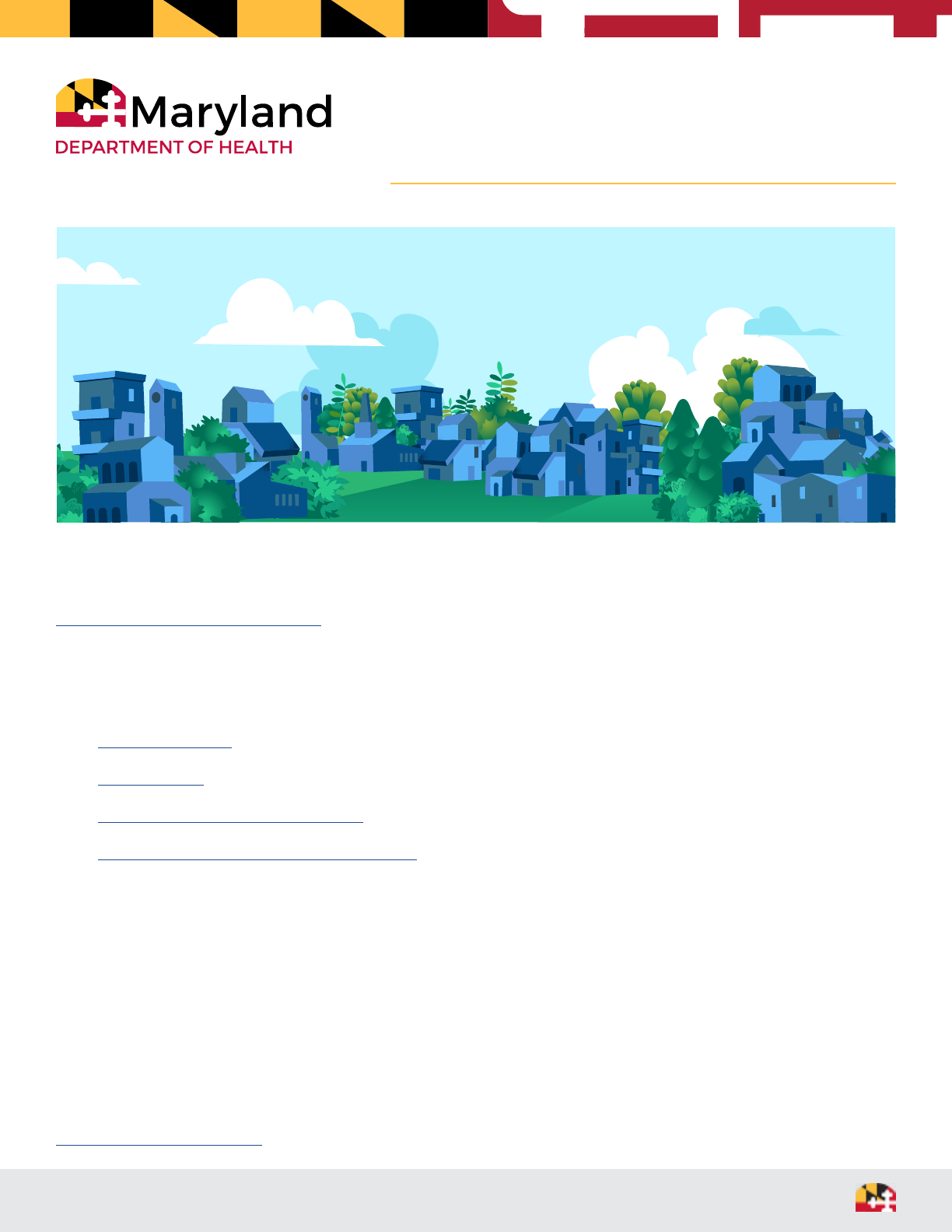
Maryland Developmental
Disabilities Administration
Find Out More:
844-253-8694 | health.maryland.gov/dda
Visit:
201 West Preston Street, Baltimore, MD 21201
Back to Table of Contents
59
GUIDE TO SERVICES FOR
PEOPLE WITH INTELLECTUAL AND
DEVELOPMENTAL DISABILITIES AND FAMILIES
Residential Services
Residential Services support you to live in the community and not in a facility like a nursing home or an
Intermediate Care Facility (ICF/IID). Holly and Potomac Centers are examples of ICF/IDDs. You decide on the type
of living situation that works best for you based on your needs, preferences and goals.
Residential Services include the following:
• Supported Living
• Shared Living
• Community Living — Group Home
• Community Living — Enhanced Supports

Maryland Developmental
Disabilities Administration
Find Out More:
844-253-8694 | health.maryland.gov/dda
Visit:
201 West Preston Street, Baltimore, MD 21201
Back to Table of Contents
60
GUIDE TO SERVICES FOR
PEOPLE WITH INTELLECTUAL AND
DEVELOPMENTAL DISABILITIES AND FAMILIES
_________________________
Supported Living
What does this service do?
This service supports you to use or develop new independent living skills in your own home. It includes help
finding an apartment or house, roommates and supports based on your preferences and choice.
What can you get in this service?
Based on your assessed need, this service includes direct support and personal care assistance. This service also
includes nursing support services and transportation.
Who can get this service?
This service is for people who:
Are 18 years old or older and have an assessed need in the PCP.
Have told their support team they want to live independently or with roommates in a home owned or
leased by them, their roommates, or their parent/guardian.
Have talked with their CCS about participating in this service.
Self-Direct Option
Budget Authority.
DDA Waiver that offers this service:
• Community Pathways Waiver.

Maryland Developmental
Disabilities Administration
Find Out More:
844-253-8694 | health.maryland.gov/dda
Visit:
201 West Preston Street, Baltimore, MD 21201
Back to Table of Contents
61
GUIDE TO SERVICES FOR
PEOPLE WITH INTELLECTUAL AND
DEVELOPMENTAL DISABILITIES AND FAMILIES
_________________________
Shared Living
What does this service do?
This service supports you to build and keep skills needed for everyday life, including spending time with others.
The service supports you to share a home and life experiences with another person, a couple or a family in the
community that you choose. The service is based on trust and commitment you and the person, couple or family
have with each other. It includes three levels of support.
What can you get in this service?
Based on your assessed need, this service can include assistance, support, and guidance (physical assistance,
instruction, prompting, modeling and reinforcement) with things like:
• Taking care of yourself and staying healthy.
• Making decisions.
• Taking care of your home and managing your money.
• Communicating with other people.
• Getting around your home and community, including transportation.
• Developing relationships and spending time with other people in the community. This includes participating
in community events or activities and using community resources.
Who can get this service?
This service is for people who:
Are 18 years old or older (unless the DDA approves for younger people).
Are not supported by family or relatives.
Have talked with their CCS about participating in this service.
Self-Direct Option
Budget Authority.
DDA Waiver that offers this service:
• Community Pathways Waiver.

Maryland Developmental
Disabilities Administration
Find Out More:
844-253-8694 | health.maryland.gov/dda
Visit:
201 West Preston Street, Baltimore, MD 21201
Back to Table of Contents
62
GUIDE TO SERVICES FOR
PEOPLE WITH INTELLECTUAL AND
DEVELOPMENTAL DISABILITIES AND FAMILIES
_________________________
Community Living — Group Home
What does this service do?
This service supports you to build and keep skills you need for everyday life, including spending time with others.
This service supports you in a home rented or owned by a provider.
What can you get in this service?
Based on assessed need, this service includes direct support, personal care assistance, transportation,and nursing
support services.
Who can get this service?
This service is for people who:
Are 18 years old or older (unless the DDA approves for younger people).
Have talked with their CCS about participating in this service.
Self-Direct Option
None.
DDA Waiver that offers this service:
• Community Pathways Waiver.

Maryland Developmental
Disabilities Administration
Find Out More:
844-253-8694 | health.maryland.gov/dda
Visit:
201 West Preston Street, Baltimore, MD 21201
Back to Table of Contents
63
GUIDE TO SERVICES FOR
PEOPLE WITH INTELLECTUAL AND
DEVELOPMENTAL DISABILITIES AND FAMILIES
_________________________
Community Living — Enhanced Supports
What does this service do?
This service supports you to develop and keep skills needed for: everyday life, spending time with others and
keeping you and others safe. It does this by providing additional behavioral supports, observation and supervision
in a home rented or owned by a provider.
What can you get in this service?
This service supports people with severe, challenging behaviors, people with court-ordered restrictions, and people
with extensive needs. Based on assessed need, this service includes direct support, personal care assistance,
transportation, behavioral support services and nursing support services. This service can also include direct
support and transportation.
Who can get this service?
This service is for people who:
Are 18 years old or older (unless approved by the DDA for a younger person).
Have talked with their CCS about participating in this service.
Self-Direct Option
None.
DDA Waiver that offers this service:
• Community Pathways Waiver.

Maryland Developmental
Disabilities Administration
Find Out More:
844-253-8694 | health.maryland.gov/dda
Visit:
201 West Preston Street, Baltimore, MD 21201
Back to Table of Contents
64
GUIDE TO SERVICES FOR
PEOPLE WITH INTELLECTUAL AND
DEVELOPMENTAL DISABILITIES AND FAMILIES
_________________________
DDA Low Intensity Support Services (LISS)
Low Intensity Support Services (LISS) is another DDA program. This program serves:
Children living at home with their family, and
Adults with developmental disabilities living in their own home.
It supports people on the DDA Waiting List and people who do not receive any support services form the DDA.
This program:
• Is flexible to meet the needs of children and adults;
• Supports independence and community integration;
• Improves children and adults’ quality of life; and
• Provides up to $2000 to help children and adults purchase approved services and items to address their needs.
Funding is limited, so the DDA uses a random selection process to pick who gets support from the LISS program.
This means everyone gets fair and equal access to LISS. If you are interested in this program, you must submit a
LISS Random Selection application. You must meet all eligibility requirements to receive LISS. This is the process:
The DDA announces when applications will be accepted,
Interested people submit an application,
The DDA randomly picks people from all of the applications,
LISS providers determine if the people picked are eligible for LISS, and
LISS providers pay for allowable items and services for the people who are eligible.
Random selection happens twice each year, once in the summer and once in the winter. If you are not selected
for funding in the summer round, you can apply again for the winter round. Your application does not stay in the
system or “roll over” to the next selection period.
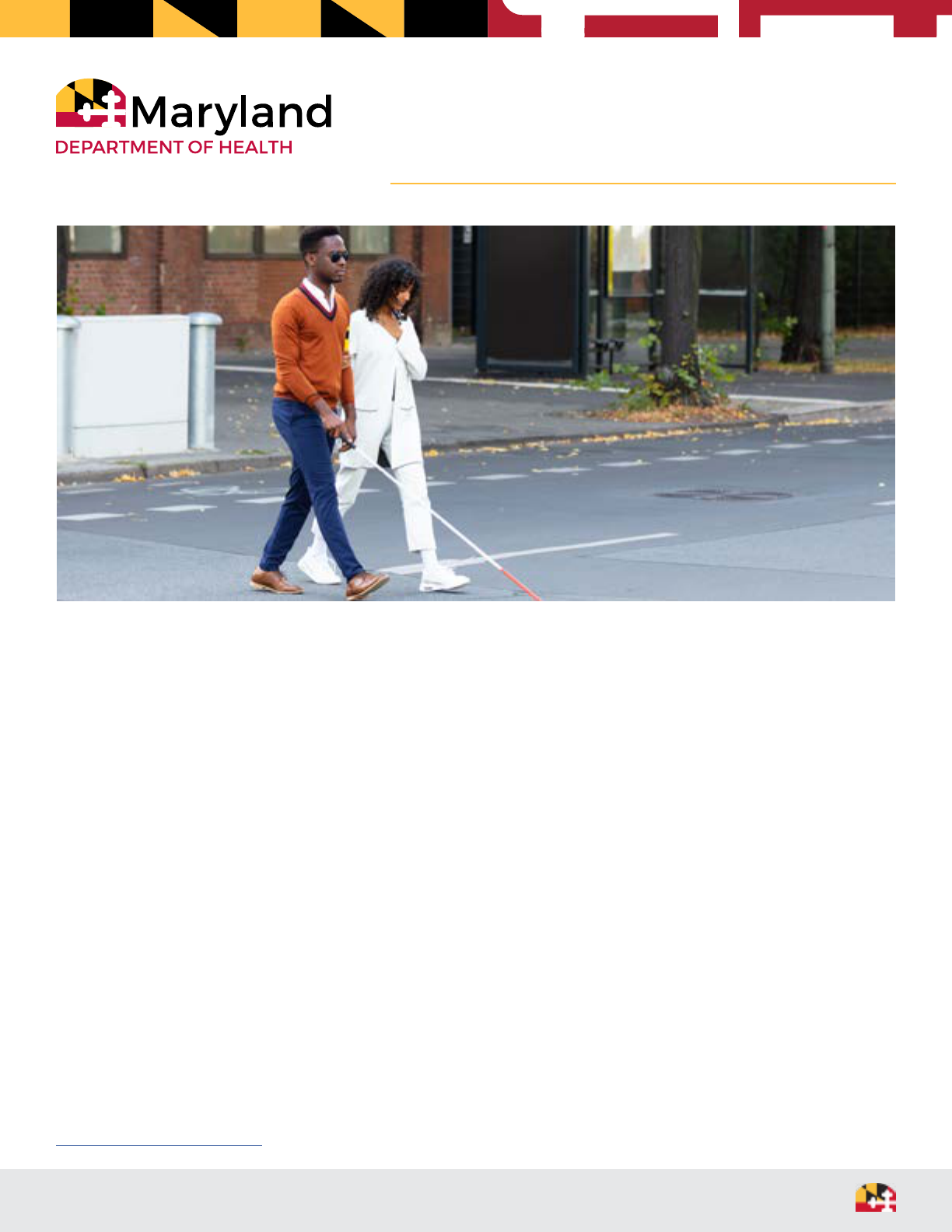
Maryland Developmental
Disabilities Administration
Find Out More:
844-253-8694 | health.maryland.gov/dda
Visit:
201 West Preston Street, Baltimore, MD 21201
Back to Table of Contents
65
GUIDE TO SERVICES FOR
PEOPLE WITH INTELLECTUAL AND
DEVELOPMENTAL DISABILITIES AND FAMILIES
Additional Resources
_________________________
Important Words and Other Information
Authorization to Participate (ATP) (page 18) — If the DDA determines you are eligible to participate in one of the
three Waivers, based upon technical and medical requirements, it sends a recommendation to the Eligibility
and Determination Division (EDD). This recommendation is the Authorization to Participate. The EDD will then
review your application to determine your financial eligibility.
ADOS or ASRS Assessment (page 9) — Autism Diagnostic Observation Schedule (ADOS) and Autism Spectrum
Rating Scales (ASRS) are common tests. They are used to see if a child might have autism. Frequently a child has
an assessment before getting a medical diagnosis of autism. These tests help some people show the DDA that
they have a developmental disability and are eligible for services. The DDA does not require these tests.
Detailed Service Authorization Tool (page 25) - The DSAT Tool is a list of proposed services a provider is offering
that can meet your needs. This list is helpful as you think about what providers to select during your Person-
Centered Planning process. Providers can complete the DSAT and give it to your CCS to review during your
planning meeting.

Maryland Developmental
Disabilities Administration
Find Out More:
844-253-8694 | health.maryland.gov/dda
Visit:
201 West Preston Street, Baltimore, MD 21201
Back to Table of Contents
66
GUIDE TO SERVICES FOR
PEOPLE WITH INTELLECTUAL AND
DEVELOPMENTAL DISABILITIES AND FAMILIES
Developmental Disability Eligibility Category (page 12) — Developmental Disability is a DDA eligibility category.
This means that you meet all of the eligibility criteria described in state law.
Focus Areas related to the Person-Centered Plan (page 20) — The DDA believes that people with intellectual
and developmental disabilities have the right to direct their lives and services. This person-centered approach
guides the DDA in making sure that services support: self-determination, self-advocacy, families, housing,
employment and assistive technology.
DDA Waiting List (page 14) — The DDA Waiting List is a list of children and adults with developmental disabilities
who are waiting for funding from DDA for community services. People on the waiting list were found eligible for
services and were put in a priority category.
Eligible or Eligibility (page 7) — Requirements to access services. To be eligible for DDA services, you must meet
state eligibility requirements.
Eligibility Determination Division (page 16) — The part of the Maryland Department of Health’s Office of
Eligibility that is responsible for deciding if you are financially eligible for the Waivers. They also complete annual
financial redeterminations, enroll, and disenroll people from the Waiver programs.
Financial Management and Counseling Services (FMCS) (page 23) — FMCS helps you with employer and
budget related accounting and payroll activities. If you choose to self-direct your services, you will have a FMCS.
The FMCS reports to the DDA about your PCP and approved self-directed budget. Your FMCS supports you to:
• Conduct background checks.
• File taxes.
• Purchase workers’ compensation.
• Process timesheets.
• Issue paychecks.
• Track budget spending.
Freedom of Choice (page 17) — You have the right to choose who provides your services, how they are delivered
and where. Your CCS will clearly explain all the options you have so that you can make the choice that is best for
you. This process is called Freedom of Choice.
Level of Care (page 16) — This is a form your CCS fills out every year. It certifies that you meet the medical
eligibility ICF/IID level of care need. That means it shows that the amount of support or care you need makes you
eligible for the DDA Waiver services. You also have to meet other DDA eligibility criteria to receive services.
LTSSMaryland system (page 18) — The LTSSMaryland system supports case management and service delivery
for several Maryland HCBS programs. It helps with the coordination, delivery and payment of services for people in
the DDA Waiver and State-Funded services.

Maryland Developmental
Disabilities Administration
Find Out More:
844-253-8694 | health.maryland.gov/dda
Visit:
201 West Preston Street, Baltimore, MD 21201
Back to Table of Contents
67
GUIDE TO SERVICES FOR
PEOPLE WITH INTELLECTUAL AND
DEVELOPMENTAL DISABILITIES AND FAMILIES
Person-Centered (page 5) — A way of thinking and planning that keeps you at the center of all decisions that
affect your life. You will see this in action when your support team focuses on your strengths and on you reaching
your goals and dreams. Person-centered services are flexible. They support your wishes and priorities so that you
can control your own life.
Person-Centered Plan (PCP) (page 6) — Each person who receives DDA services has a PCP. The PCP includes
information on all the services and supports you have now or are planning to use that help you meet your goals.
Your PCP describes your interest, preferences and goals. It is your plan to help you live a good life based on what
you think is important.
Regulations (page 23) — State agencies like the Maryland Department of Health write regulations to guide how
services and supports are to be provided according to Maryland state law.
Request for Reconsideration (page 13) — If you disagree with the eligibility category (Developmentally Disabled,
Supports Only, or Not Eligible) or the priority category (Crisis Resolution, Crisis Prevention, or Current Request)
you have been assigned, you can ask the DDA to take a second look at your DDA eligibility. When you make this
request for a review, it is called a request for reconsideration.
Support Broker (page 28) — A service available if you self-direct your services. You get to choose if you want a
support broker. They can help you carry out your responsibilities as an employer. Support Brokers:
• Help you decide what will work best for staff, services, and supports;
• Help with day-to-day management of employees; and
• Help with other responsibilities you have as an employer.
Supports Only Eligibility Category (page 12) — Supports Only (SO) is a DDA eligibility category. This means that
you do not meet all of the eligibility criteria for DD eligibility as described in Maryland State law. You do not qualify
for full DDA services. You only qualify for DDA support services that are paid for with state funding.
Transitioning Youth Planning (page 11) — The goal of transitioning youth planning is to support students with
disabilities as they go through school and prepare for life in the adult world. This includes planning for college,
work, transportation, living arrangements, health care and daily living.
Vocational Assessments (page 9) — A vocational assessment is a review of your skills, abilities, employment
experiences and job-related goals. This is completed by a licensed professional. It is used to help you and your team
set goals and plan services.
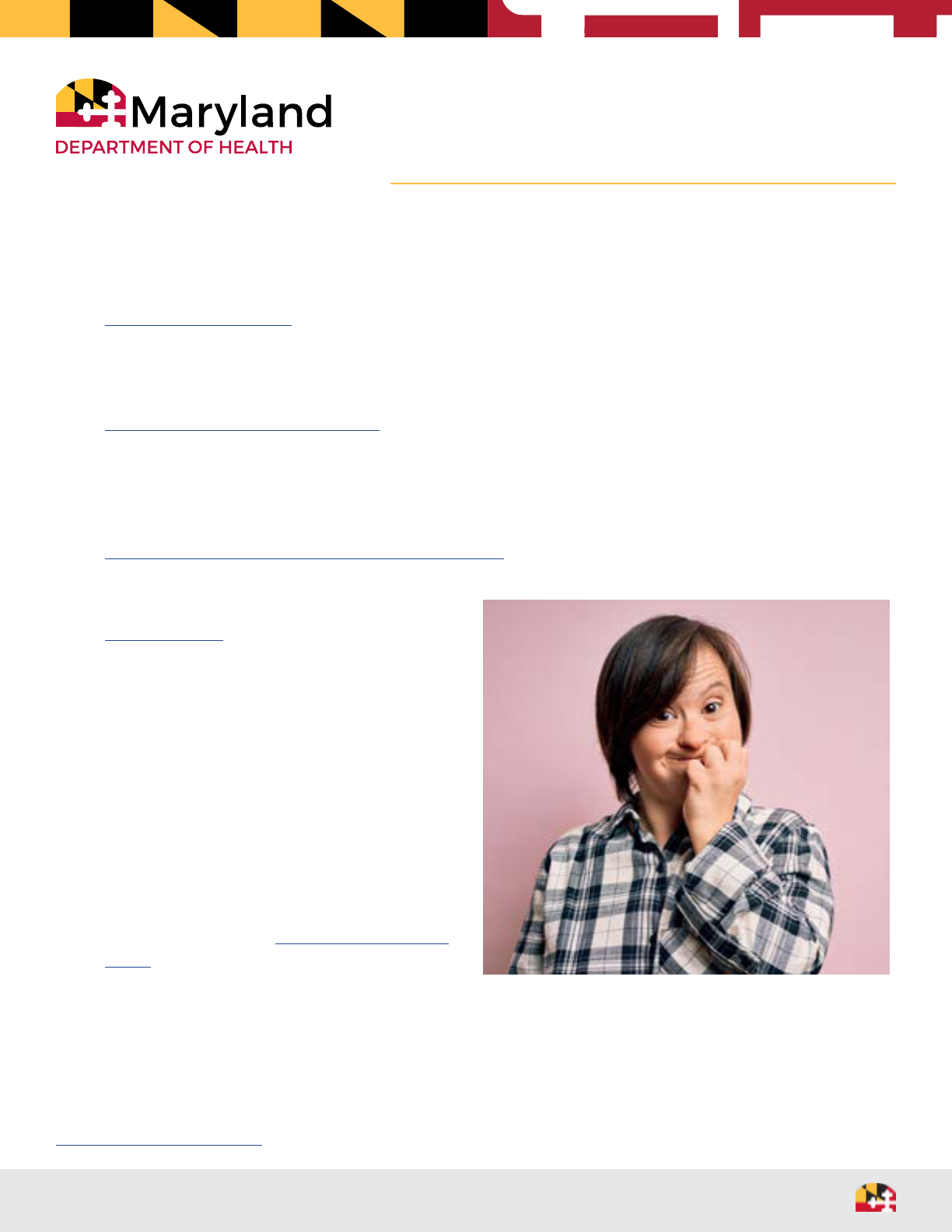
Maryland Developmental
Disabilities Administration
Find Out More:
844-253-8694 | health.maryland.gov/dda
Visit:
201 West Preston Street, Baltimore, MD 21201
Back to Table of Contents
68
GUIDE TO SERVICES FOR
PEOPLE WITH INTELLECTUAL AND
DEVELOPMENTAL DISABILITIES AND FAMILIES
_________________________
Community Resources Recommended by Maryland Families
1. Social Security Redbook is a helpful guide about employment supports for people with disabilities. This is
also known as the “Red Book.” It covers supports under the Social Security Disability Insurance (SSDI) and
Supplemental Security Income (SSI) Programs.
2. Plan to Achieve Self-Support (PASS) is a part of the Supplemental Security Income Program. It helps
people with disabilities return to work. PASS lets people with disabilities set aside money to pay for items
or services they need to reach a specific work goal. This can include supplies to start a business, school
expenses, equipment and tools, transportation, uniforms and other items or services.
3. Supplemental Nutrition Assistance Program (SNAP) helps people with low income buy nutritious food.
There are special rules for households with elderly members or people with disabilities.
4. Maryland ABLE is an easy-to-use savings
program. It makes it possible for people with
disabilities and their families to save and invest
money without losing the federal and state
benefits they need, like Supplemental Security
Income and Medicaid. The money in an ABLE
account must be used for things that help the
person with a disability support or improve
their health, independence or quality of life.
Not only can the person with a disability put
money in their account, but so can family, friends
and others. Marylanders who put money in a
Maryland ABLE account lower their state taxable
income. Check out the Maryland ABLE User’s
Guide for more information.

Maryland Developmental
Disabilities Administration
Find Out More:
844-253-8694 | health.maryland.gov/dda
Visit:
201 West Preston Street, Baltimore, MD 21201
Back to Table of Contents
69
GUIDE TO SERVICES FOR
PEOPLE WITH INTELLECTUAL AND
DEVELOPMENTAL DISABILITIES AND FAMILIES
5. Special Needs Trusts are an estate planning tool. They are a way for a person with a disability to receive
financial support without affecting their eligibility for benefits like Medicaid or SSI. There are different
types of special needs trusts. You should meet with a financial advisor for guidance and help. To learn more
about special needs trusts and other tools that help families plan and save, see the Maryland DD Council’s
Planning Now guide in English or Spanish.
6. Department of Human Services – Respite Program, provides short-term, periodic and temporary support
to a person with a developmental or functional disability. It provides a period of rest and renewal for the
caregiver. For eligibility and how to apply, contact your local Department of Social Services to speak to a
caseworker who will assist you.
7. Department of Disabilities – Attendant Care Program, reimburses the costs people or their families pay
attendants for assistance managing severe chronic or permanent physical disabilities. Attendant care
services can be provided at home, school, work or elsewhere. This program is for adults ages 18-64.
8. Housing Choice Voucher is a federally funded, locally managed rental assistance program. This program
helps pay rent for lower-income families, the elderly and people with disabilities so they can afford decent,
safe housing. The Maryland Department of Housing and Community Development manages the program
in parts of the Eastern Shore and Western Maryland. These include the following counties:
• Allegany
(including the City
of Cumberland)
• Caroline
• Dorchester
• Frederick
• Garrett
• Kent
• Somerset
• Talbot
• Wicomico
• Worcester
For information on programs in other Maryland counties, contact your local housing authority.
9. Transportation Assistance is provided by the Maryland Transportation Authority (MTA) for people with
disabilities. It is available in some parts of Maryland. The MTA MobilityLink is a paratransit program for people
with disabilities who are unable to use the MTA fixed route systems. These include CityLink, LocalLink, Metro
SubwayLink or Light RailLink services. To learn more about the MTA click the following link: MobilityLink |
Maryland Transit Administration.
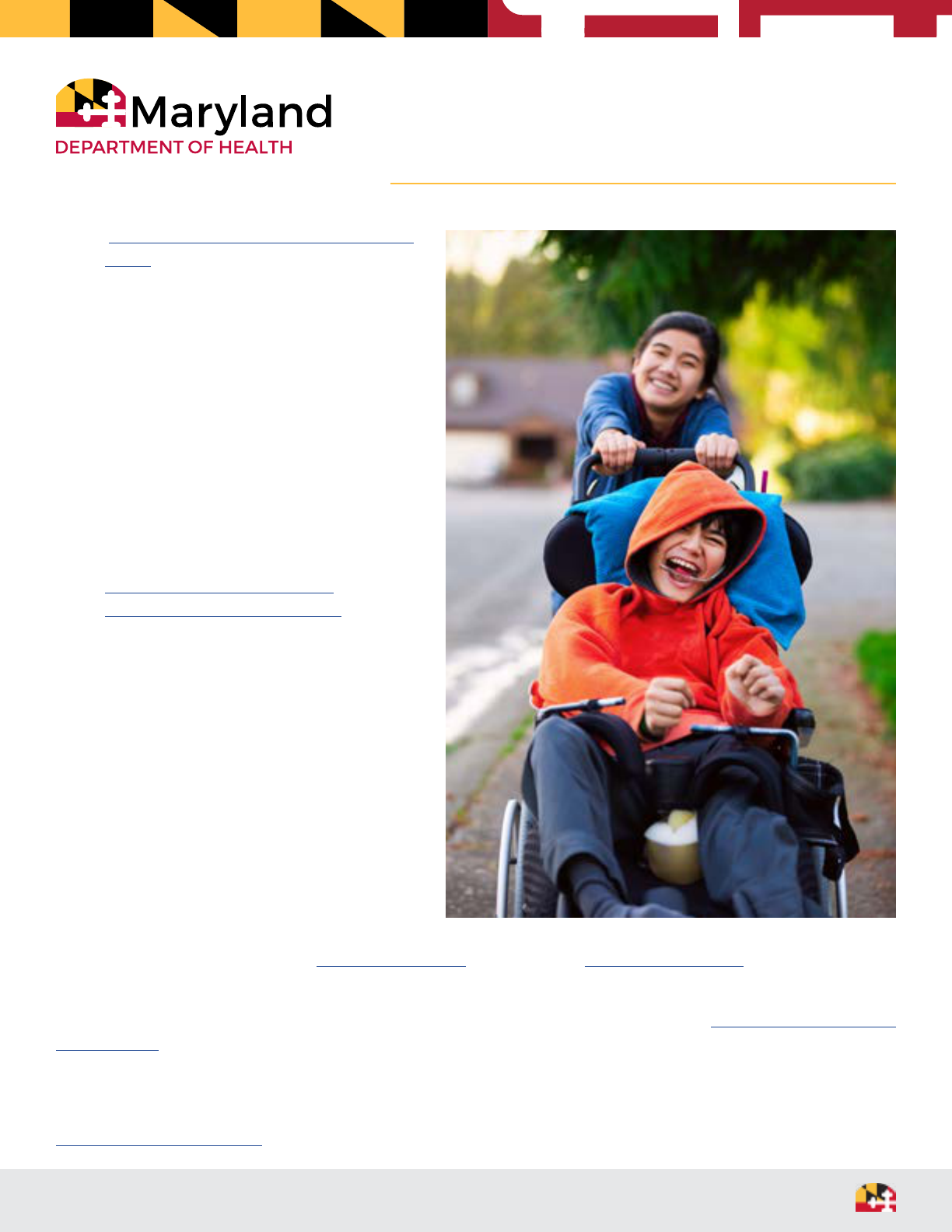
Maryland Developmental
Disabilities Administration
Find Out More:
844-253-8694 | health.maryland.gov/dda
Visit:
201 West Preston Street, Baltimore, MD 21201
Back to Table of Contents
70
GUIDE TO SERVICES FOR
PEOPLE WITH INTELLECTUAL AND
DEVELOPMENTAL DISABILITIES AND FAMILIES
10. Rare and Expensive Case Management
(REM): Most people who qualify for
Medicaid are eligible for HealthChoice
and must enroll in a Managed Care
Organization. HealthChoice manages
and pays for their health care. REM
is a program that is an alternative to
HealthChoice for people with specific rare
and expensive conditions. You must be
eligible for HealthChoice to receive REM
services. REM offers service coordination,
home visits and other services.
You can get more information on REM by
calling 1-800-565-8190 or 410-767-1903.
11. The Maryland Department of
Rehabilitation Services (DORS)
helps people with physical, emotional,
intellectual, developmental, sensory,
and learning disabilities go to work and
keep their jobs. DORS provides services
like career assessment and counseling,
assistive technology, job training, support
for college and job placement. DORS
will assign a counselor who will talk with
you about DORS services and find out if
you are eligible for these services. Many
DORS counselors are specially trained to
work with specific groups like high school
students or people who are deaf/hard-of-
hearing, blind or have mental illness. To get
a DORS counselor, fill out an online referral form or contact your nearest DORS Office. You are welcome to
bring a support person, such as a family member, friend, or advocate to any appointment with DORS.
The DDA encourages people with developmental disabilities and their families to use the Charting the LifeCourse
Quick Guides in planning for each lifestage and connecting.
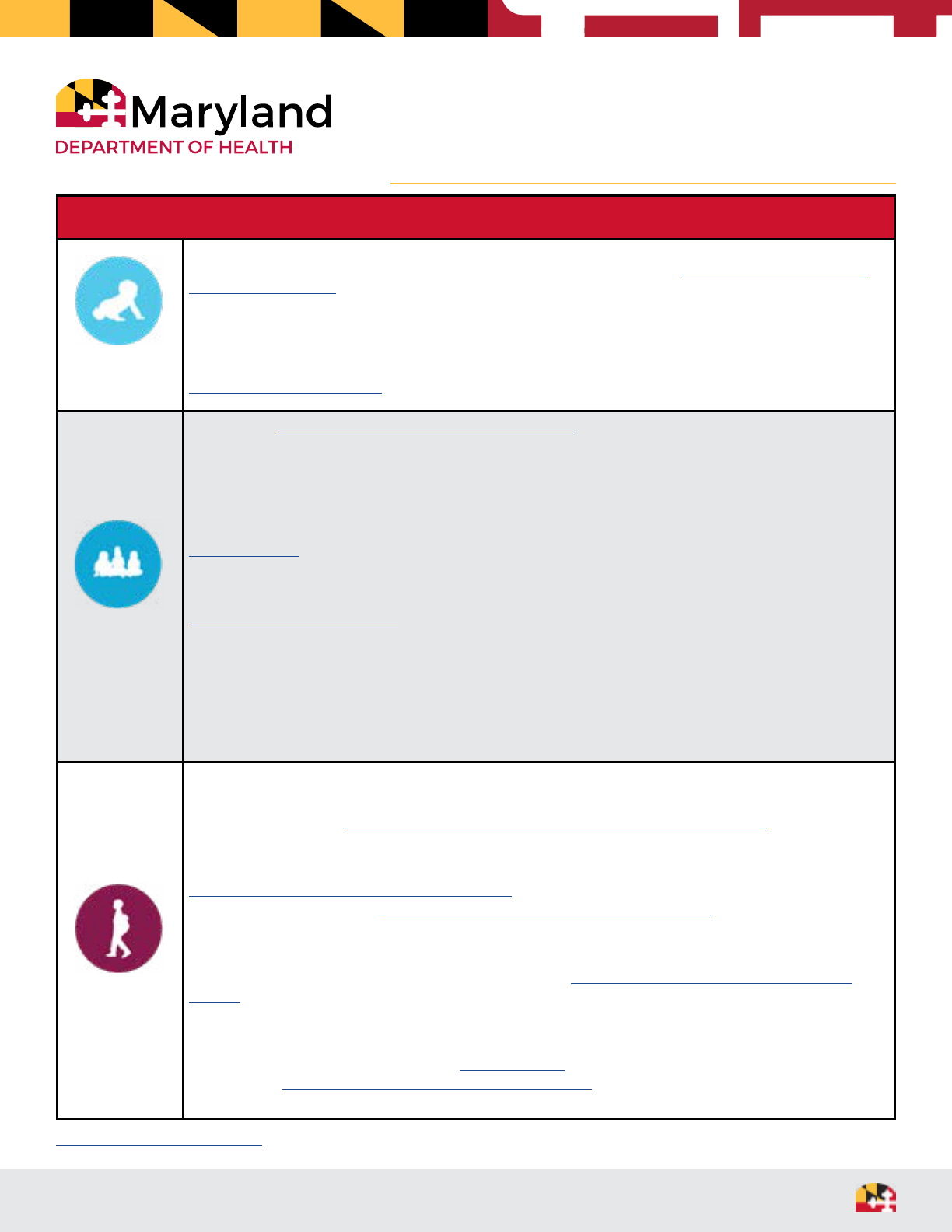
Maryland Developmental
Disabilities Administration
Find Out More:
844-253-8694 | health.maryland.gov/dda
Visit:
201 West Preston Street, Baltimore, MD 21201
Back to Table of Contents
71
GUIDE TO SERVICES FOR
PEOPLE WITH INTELLECTUAL AND
DEVELOPMENTAL DISABILITIES AND FAMILIES
Maryland’s Preschool Special Education Services provides specialized instruction and
related services. This includes speech-language, physical and occupational therapies.
These services are for children ages 3 through 5 who are eligible under the Individuals with
Disabilities Education Act and follow State regulations for special education.
*Keep copies of all assessments for adult service applications.
Model Waiver, is a program for medically fragile people. It provides services in the
community instead of in a hospital setting.
(Admission to this Waiver must be completed before 22 years old).
Maryland’s Autism Waiver offers services to children ages 1 to 21. This is a partnership
between the Maryland State Department of Education (MSDE) and the Maryland
Department of Health (MDH).
The Autism Waiver (AW) provides community-based, long-term, person-centered
therapeutic services and support. This is for eligible children and youth with Autism
Spectrum Disorder (ASD). This supports home and community living as an alternative to
institutional care.
School age children, ages 3 to 21, may benefit from an Individualized Education Program
(IEP). Learn more at Specially Designed Instruction & Transition Planning.
Transitioning Youth is a term used for children ages 14 to 21 who are preparing to leave
school. This is a special category of DDA eligibility and priority for services through the
Governor’s Transitioning Youth Initiative. This initiative makes it possible for the DDA,
in collaboration with the Division of Rehabilitative Services (DORS), to fund supported
employment and other day services. This is for students leaving school when they turn 21
who otherwise may not have received DDA services.
Information about Transition Planning is found at MD Secondary Transition Planning
Guide.
At age 18, you may also want to apply to both MedicalAssistance and SSI (Supplemental
Social Security Income).
Apply for Supplemental Security at www.ssa.gov and
Medicaid at https://www.benefits.gov/benefit/1278.
Lifestage Resources
Assessments and early intervention support is available through Maryland’s Infants and
Toddler’s Program.
*Keep copies of all assessments and medical records for adult service applications.
Family Support Centers are part of each local school system. They are available for families
and children from birth to 21.
Family Support Services
Early
Childhood
School-Age
Prenatal/
Infancy
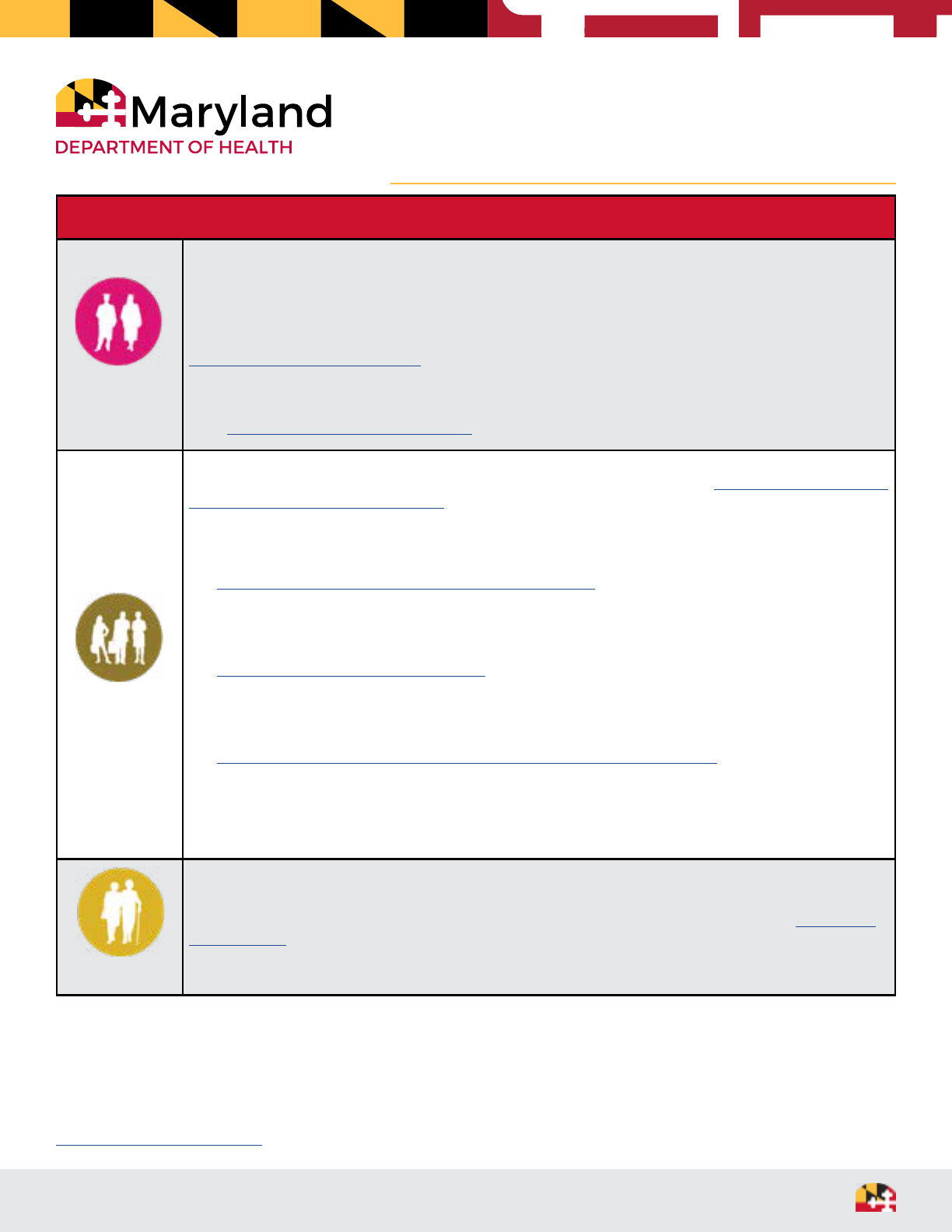
Maryland Developmental
Disabilities Administration
Find Out More:
844-253-8694 | health.maryland.gov/dda
Visit:
201 West Preston Street, Baltimore, MD 21201
Back to Table of Contents
72
GUIDE TO SERVICES FOR
PEOPLE WITH INTELLECTUAL AND
DEVELOPMENTAL DISABILITIES AND FAMILIES
Lifestage Resources Continued
You can work and still get disability benefits. Social Security’s disability programs and other
benefit programs have rules called “work incentives.” You can use these to work and keep
your benefits. Some work incentives can protect benefits permanently. Others can help you
keep benefits at least until you earn enough to replace them. Others make it easy to get
back on benefits if you stop working. Find out more at
SSI/SSDI & Benefits Planning.
Benefits counseling is available through Division of Rehabilitation Services (DORS). If you
have a case open with DORS, ask your DORS counselor for more information. To open a
case contact your local DORS office.
Connect with other families and people with disabilities through the Maryland Supporting
Families Community of Practice.
Consider connecting with the following groups if you are interested in advocating for
disability rights:
• Maryland Centers for Independent Living (CILs) are community-based organizations
designed and operated by people with disabilities. The MD CILs serve people with
all types of disabilities. Their work includes providing peer support, information and
referral, advocacy and independent living skills training.
• People on the Go (POG) Maryland - POG is a group of advocates with intellectual and
developmental challenges. They use their voices to be heard and recognized. POG
is a partnership with the Maryland Developmental Disabilities (DD) Council and the
Maryland Center for Developmental Disabilities (MCDD) at Kennedy Krieger Institute.
• Maryland Developmental Disabilities Council (MD DD Council) - The MD DD Council
is an independent state agency. It is led by people with developmental disabilities and
family members of people with developmental disabilities. The MD DD Council creates
change to make it possible for people with developmental disabilities to live the lives
they want with the support they need.
The Maryland Department of Aging (MDoA) and the statewide network of 19 Area Agencies on
Aging assist older Marylanders with a range of services and sources of information. Programs
and Services for adults as they age are available whether or not you have a developmental
disability. These programs provide health, financial and safety support for Maryland residents.
Remember to talk with your CCS, regional office, family, or friends if there is something in this guide you do not
understand. Please also refer to the federally approved waiver applications and regulations for more information.
Working-Age
Adults
Adulthood
Aging

